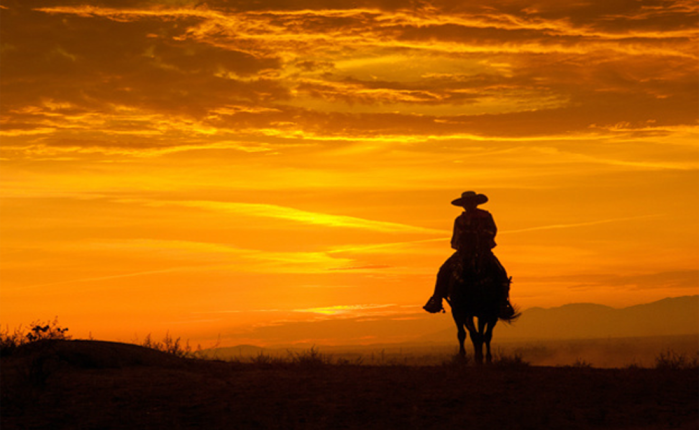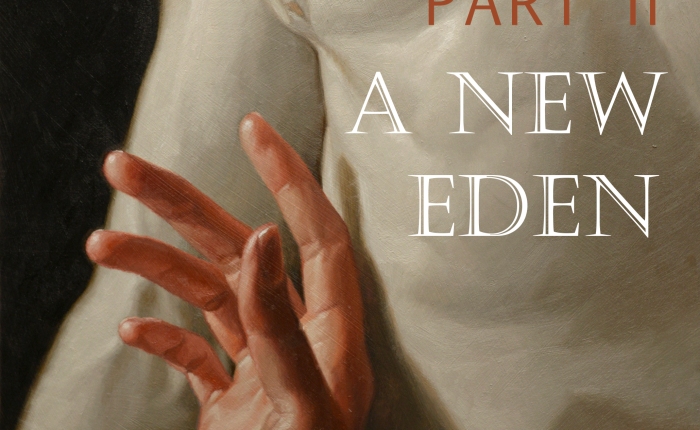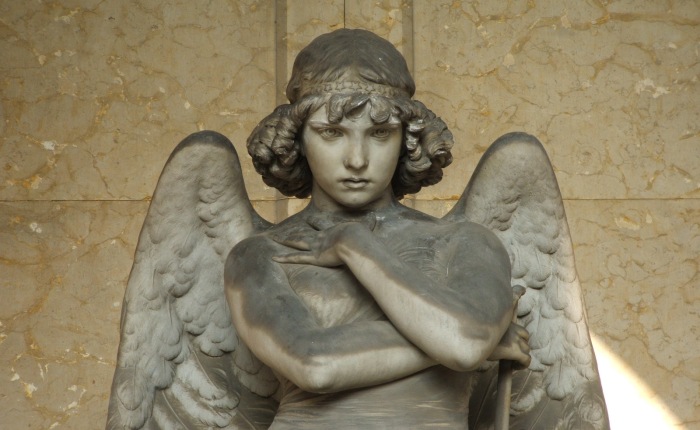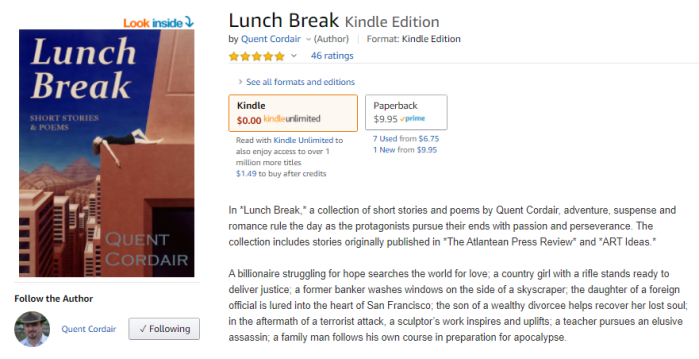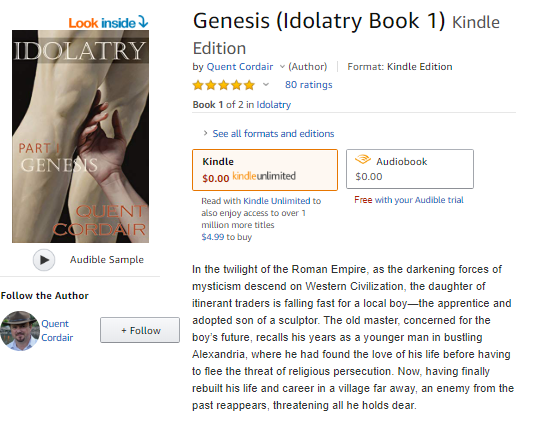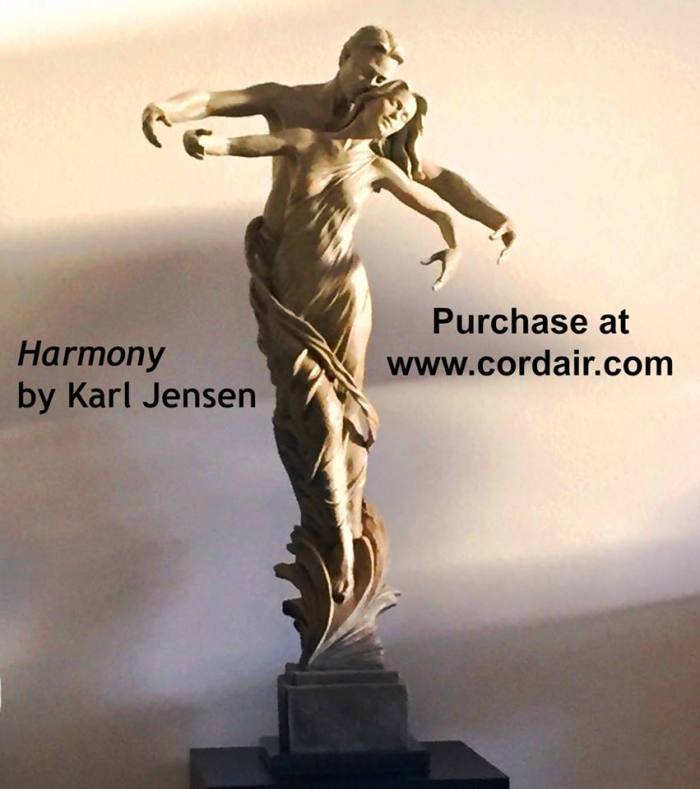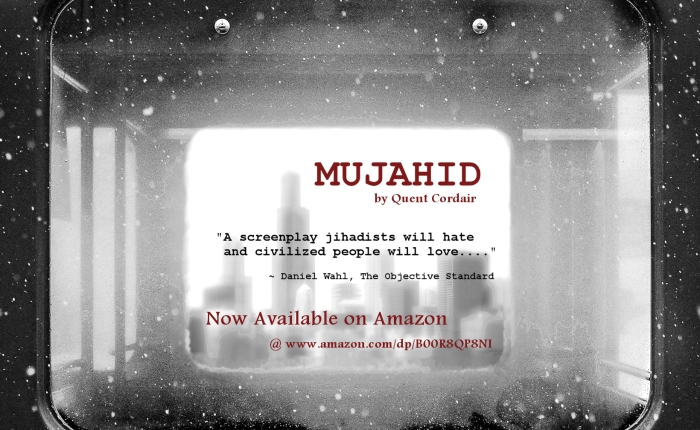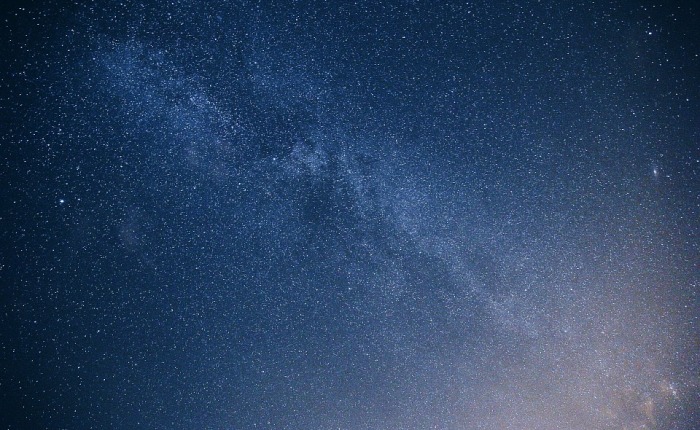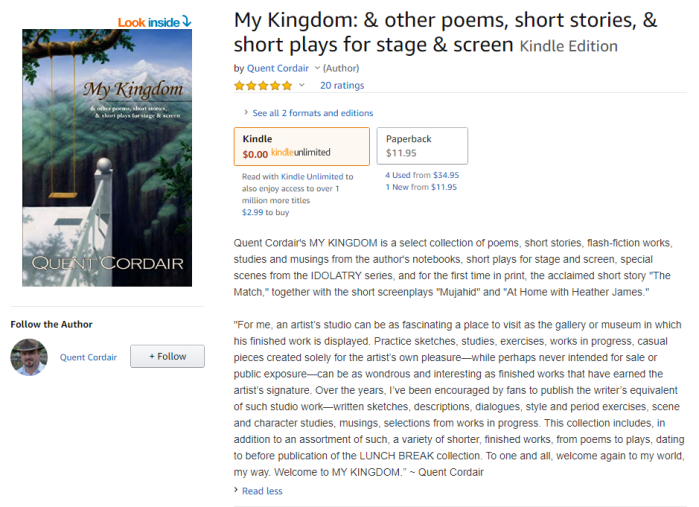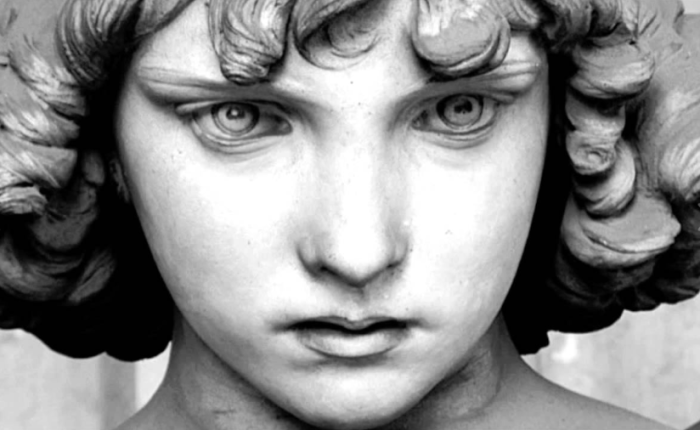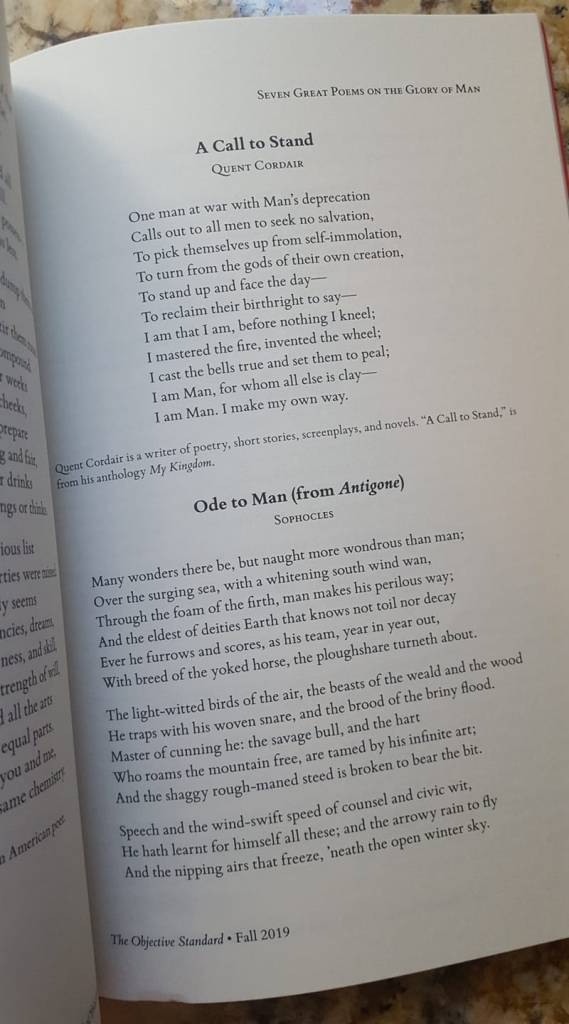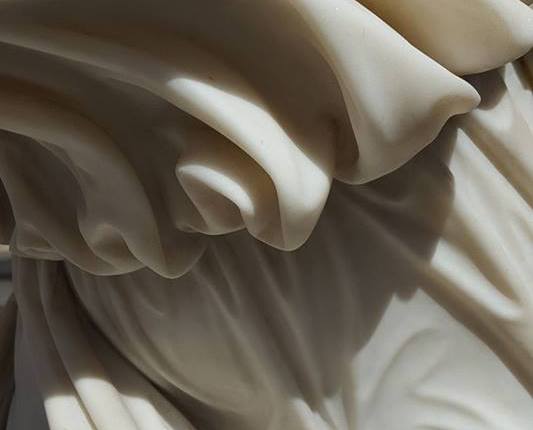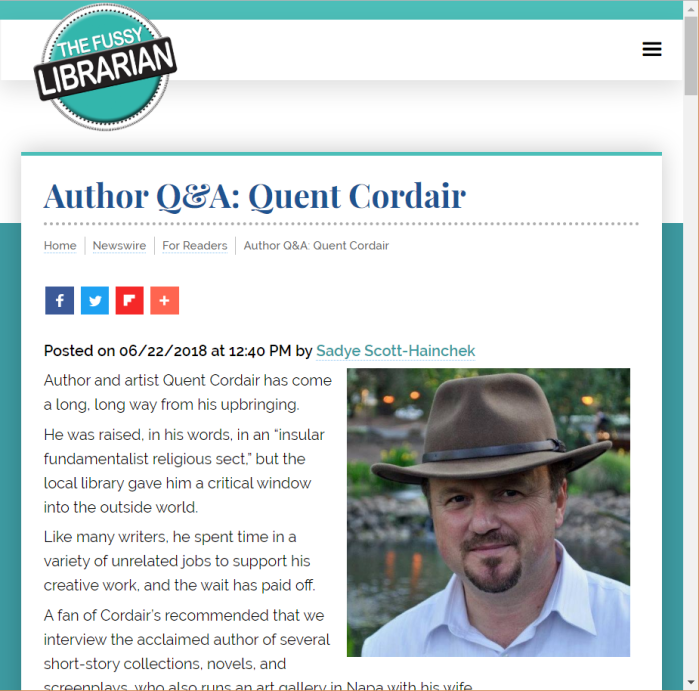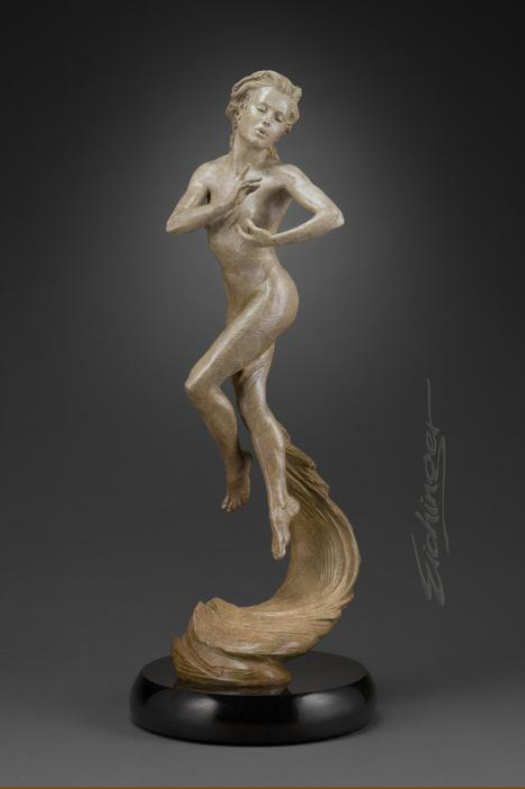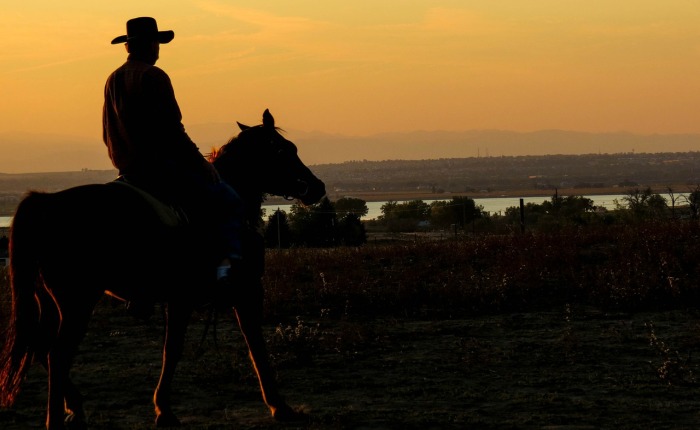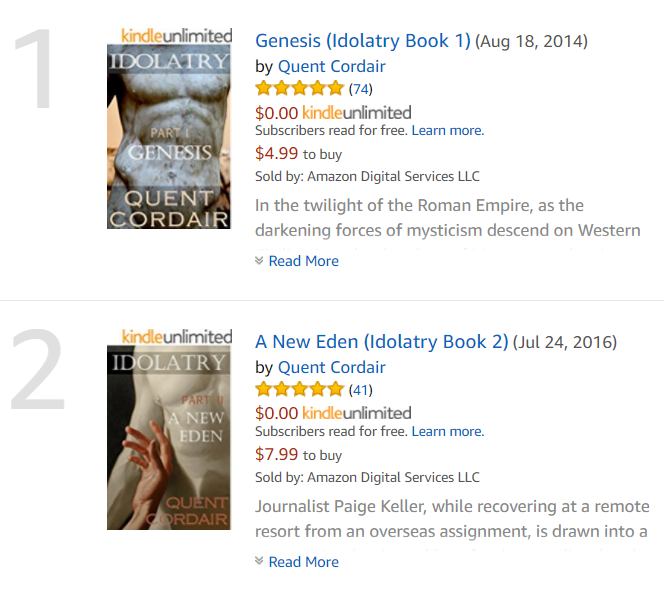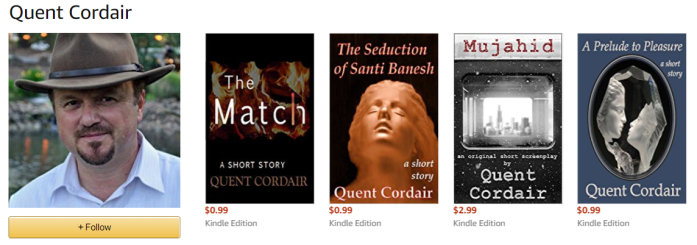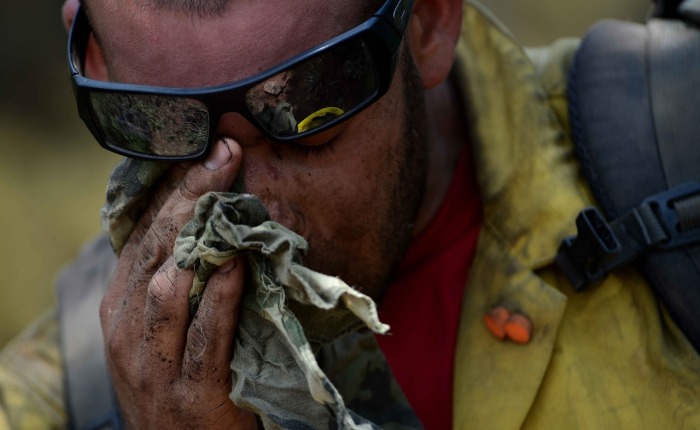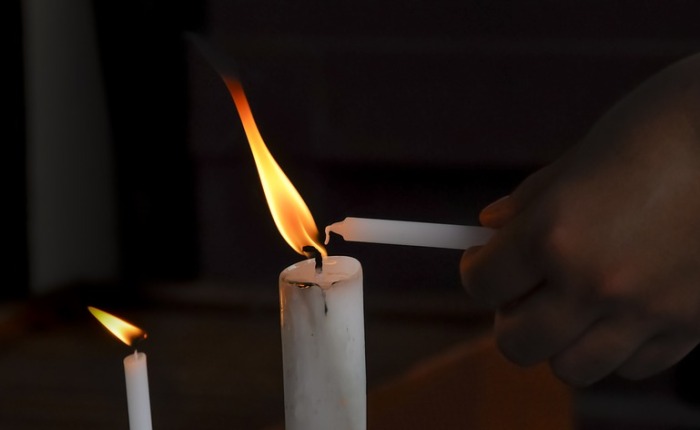Let the dead bury the dead,
Let the wounded heal behind,
Let the cowards run from courage,
Let the deaf lead on the blind.
Leave the schemers to their scheming,
Leave the plotters to their plots,
Leave the sheep to follow shepherds,
Leave the spiders spinning knots.
Leave the gullible to liars,
Let the liars fear the truth,
Leave the power-hungry preying
On each other, claw and tooth.
Leave the tribal drummers drumming,
Cannibals to eat themselves,
Leave conspiracists conspiring
With the cans on empty shelves.
Leave the fantasies to mystics,
Let the preachers point with scorn,
Leave the critics to their picking
While the clowns keep shucking corn.
Leave subjectivists judgmental,
Leave intrinsicists their airs,
Leave the dreamers to their dreaming,
But invite the one who dares.
Fix your eyes on the horizon,
Take your bearing, plot your course,
Set the village dogs to barking,
Load your gun, spur your horse.
~ Quent Cordair
Copyright 2023
In light of Roe v. Wade
In light of SCOTUS overturning Roe v. Wade, I offer the following from A New Eden, Part II of Idolatry:
*****
Sophia’s white-gloved hands were lying in her lap, holding the Easter lilies she had taken from the arrangement next to where the casket had been.
“Keep driving please, Sam.”
Sam kept driving, passing the turnoff to the garage, continuing at a measured pace down the narrow lane, over the rolling grassy hills and through the shaded woody vales, all the way to the back of the estate, to where on the crest of the last hill stood the majestic red oak, where from the oak’s high branch hung the swing.
Sophia could still hear the squeals of delight as Roger or Aaron would push Julie. “Higher! Higher!” Julie would demand, her bare legs and feet reaching for the sky, her head thrown back in abandon as she arced out and up, over the falling slope beyond, over the easterly flatland, finding weightlessness in the open sky.
“Momma, I’m flying. . . .”
As had become their custom, Sam stopped the car fifty yards short. Sophia walked alone the rest of the way. She stood now before the swing, staring blankly at the empty wooden seat as it creaked and rocked gently in a passing lullaby of a breeze. Standing here, she would always be able to hear her daughter’s floating, soaring laughter. The memory, a mother’s sacred blessing, was now her burden forever to bear. Next to the swing was the granite stone, flush in the ground. On the stone’s polished face, unmossed and unweathered, the engraved letters and dates were too fresh, too young, too new. They always would be.
Almost from the moment Julie became a teenager, the laughing had ceased and the struggle had begun. Her driving desire for independence pushed against all restraints—reason and sensibility be damned. Missed curfews, angry arguments, stony silences, hurled accusations, slammed doors. Sophia wasn’t terribly surprised—her daughter had always been willful and independent, as Hales tended to be—yet she was disappointed. She had hoped to be spared. Aaron, through his teens, had never caused the slightest problem or concern. Julie lashing out was wounding, to be sure, but Sophia endured, knowing they would get through it somehow, as countless mothers and daughters through the ages had gotten through such phases. With all the sympathy and empathy she could muster, she kept the relationship tacked and pinned and stitched together through the strains, impasses, bitterness and tears, knowing that the two of them would survive and overcome, eventually. They were strong. They loved. They trusted each other. They were honest. Sophia would be there, waiting on the other side for her healthy, happy daughter to re-emerge. It would only be a matter of time, of perseverance. . . . But it required more patience than Sophia ever imagined she would have to find.
Then, in the middle of Julie’s fifteenth year—sooner than Sophia had hoped or expected—Julie’s demeanor changed. Indeed, her entire personality changed, practically overnight.
She had met a boy from the Church who convinced her to attend a youth service with him. Within a week, she declared herself a Christian, a redeemed Lamb of the Flock—saved. At meals she effused about Jesus’ fathomless love and God’s grace, which was not only her own personal salvation but the salvation of the whole world. Her black jeans, her formless, dark sweatshirts and her ragged sneakers were replaced by conservative knee-length dresses and low-heeled shoes and sandals. Her black hair with the rebellious red streak was dyed back to the original brunette. Her pixie cut was left to grow back out. Her makeup and jewelry were discarded—Sophia quietly rescued a set of diamond studs and a string of pearls from the garbage.
Her mother had welcomed the change with only minimal unease. At the dinner table, Sophia preferred the exhortations and enthusiasm for all things Flock to the seething and heavy silences punctuated with spewed anger. Yet she couldn’t shake the feeling that her daughter had jumped out of the frying pan and into—not the fire, but a vat of warm, sugary, liquid gelatin. The overt kindnesses and effervescent expressions of love for everyone and everything seemed to Sophia little more genuine or justified than the anger and venom. How long would this new spiritual high last? How long would the new medium buoy Julie up? How long before the gelatin would begin to solidify around her? How long before the spell broke?
Less than six months, as it turned out. In the middle of the school year, Julie insisted on transferring from her private school to the Flock’s academy. Roger had refused initially, but with Sophia’s patient persistence and urging, he finally acquiesced.
At the beginning of the summer break, Julie had travelled with a busload of Flock youth to a Church retreat at a campground in southern Idaho. When she returned, the effervescence and effusiveness had vanished. She wouldn’t talk, she wouldn’t open up, no matter what Sophia or Roger or Aaron tried. Once again, she shut everyone out. Through the locked bedroom door, her pillow-muffled, retching sobs could be heard late into the night. Surely, Sophia guessed, the problem was now a boy, perhaps even a girl—but she could get nothing out of her daughter.
After a few days, Julie pulled herself together enough to continue attending church services and activities. She donned a brave smile but remained subdued. A few weeks later, Sophia came home at midday to meet with the electrician about the pool heater. Julie’s book-bag and purse were on her bed. Julie herself was nowhere to be found. On a mother’s hunch, Sophia drove to the back of the property.
Julie was there on her swing, rocking herself gently, head leaning against one of the ropes. After a forlorn search of her mother’s eyes, the dam finally broke and the despair poured out. Julie was pregnant, of course. It had been a Flock boy, of course. She wouldn’t say which. She had gone to a church counselor that morning. He had informed her in gentle but firm terms that her only option was to have the baby—unless she wanted to lose her soul and go to hell for the murder of one of God’s children. Still hardly more than a child herself, Julie was distraught, devastated.
Sophia was heartbroken for her daughter—and furious, not at Julie’s actions, but at the Church’s response. She pried the name of the counselor out of Julie and arranged a meeting. The counselor was polite and empathetic, but he wouldn’t back down. He insisted he would have told the same to his youngest daughter, a year younger than Julie: murder was murder. There was now a child of God in Julie’s womb, and Julie’s duty was to carry her God-given burden, to give birth, and to raise the child to adulthood. Julie’s life was no longer her own. Other young mothers had managed it—Julie would manage it as well. Fortunately she had Sophia to help her. God didn’t promise that our lives would be easy, only that it was our duty to carry whatever cross he gave us to bear on this earth, for which we would be rewarded in heaven.
Sophia next stormed the parish, but Reverend Lundquist was away on a tour of the Flock’s missions in Central America. He couldn’t be reached, or so his secretary insisted. Sophia’s daily messages went unanswered.
For two more agonizing weeks, Julie struggled. She struggled with her conscience and with her hopes for her future, with her hopes for her life and for her soul. When Julie allowed it, her mother was at her side. In the end, with her mother’s approval and escort, she made an appointment at the clinic and had the abortion.
The drive home had been in a thick silence. Sophia reached out to hold her daughter’s hand. Julie pulled away, clasping her own hands in her lap, staring out of the window.
She stopped going to church. Sliding back into her darkness, she began palliating her shame and grief with food—any and all food she could get her hands on, any she could keep down. After gaining thirty pounds, she suddenly stopped eating and lost all the weight—and then more weight. She returned to church and went to a different Flock counselor, this time a woman, who told her that God would forgive her, but only if she were truly and genuinely remorseful and ashamed for her grievous sins, for having sex out of wedlock and for murdering her unborn child. Given the severity of the transgressions, the counselor prescribed a six-month regimen of weekly personal and group counseling and prayer, supplemented by five hundred hours of voluntary duty in the orphanage, taking care of the babies that other young mothers, following God’s will, had given birth to. Julie asked her mother later what had happened to all the mothers of those babies. Sophia could only guess. A couple of them, she knew, had worked at the resort, but they had long since disappeared from the community.
Long talks between mother and daughter and longer silences followed. Julie regretted having slept with the boy, or more accurately, having done so without protection, but she couldn’t bring herself, as hard as she tried, to feel wrong for having done so. She was chagrined at having made what she considered to be a serious mistake, but she simply was not ashamed of it, and she couldn’t make herself feel an emotion she didn’t feel. The act of lovemaking, she told her mother, had seemed neither wrong nor unnatural. She had been following a desire that God surely had given her for a reason. She had felt terrible about the abortion but she couldn’t bring herself to feel genuinely guilty for that either, given the alternative, which was simply unthinkable to her—and she was too honest to fake a remorse that didn’t and couldn’t exist.
She attended another few church services. Of course they knew. Everyone knew. One of the girls working at the clinic probably had a friend of a friend who was a Flocker. The only secrets in Aurum Valley were the ones nobody cared about. As she told her mother afterwards, she felt as if the whole congregation were watching her. Many had gone out of their way to express sympathy and understanding, seeming almost grateful for something they wouldn’t come out and name, as though they were somehow relieved at what she had done—that she, Julie Hale, was a sinner—that she, of all the girls in the valley, had sinned.
Sophia accompanied Julie to church the next Sunday, and she experienced it too. She was approached and greeted eagerly with a fresh, enthusiastic acceptance, as though the Flock members were appreciative that Sophia and her family had been brought down to a status as low—perhaps even lower—than their own. God had revealed that the Hales, too, were subject to human fallibilities and carnal hungers; their weakness and true nature had finally been revealed; they had been brought down to a position from which only God could raise them up again, up to the more humble plane of the Flock.
Julie lost another twenty pounds she couldn’t afford to lose before waking in the hospital with an IV in her arm, having fainted in her room while the rest of the family ate dinner. As her daughter was being released, three days later, Sophia had choked back tears on catching a glimpse of Julie’s back when she was changing into her street clothes. She looked like a concentration-camp victim, all skin and bones. It was less than a month later, on another spring day as faultless and beautiful as this Easter afternoon, that the housekeeper found Julie hanging in her bedroom closet, the belt from her Procession robe around her neck.
Julie had never had a chance to wear the robe. She had been so pleased and excited when she bought it, months ahead of time. She was so looking forward to her first Procession. Sophia had left the robe hanging in the closet.
*****
Quent Cordair, A New Eden, Part II of Idolatry, 2016
https://www.amazon.com/New-Eden-Idolatry-Book-ebook/dp/B01J2KPSNW
Afghanistan
Again comes the cry, again comes the mourn,
Clutched fingers in hair over flowers forlorn;
Candles all lit till the night wetly glows,
Coffins wrapped neatly in black satin bows.
Shadows beg mercy where mercy’s unknown,
Prayers and peace offerings all fruitlessly sown,
The desperate prostrations all fail to suffice
For those taking no less than blood sacrifice.
There’s left but one answer to those who love death,
Whose sword demands kneeling until the last breath,
Those blinded to reason, faith shrouding their eyes
Till torn from their skulls as their creed’s final prize.
There’s left but one choice, for those who love life,
In answer to those sworn to murder and strife:
When faith-deafened minds every argument shun,
When no word can turn what no logic has won,
When pleas have been met every time with a gun—
Swift granting of death is the deed sooner done.
~ Quent Cordair
image: The Monteverde Angel, Giulio Monteverde
Steam
The increasingly desperate fervency, the unshakable commitment and loyalty, the blind doubling down of souls answering the call of their chosen savior – there it is again, the pre-rational, primordial stew out of which so many religions were born. Where there is faith, there are those ready to follow; out of the churning, simmering pools of hopeful followers, leaders will rise. Muhammad, Jesus, Moses, Joseph Smith — how much was forgiven of them, how many sins and improprieties excused, overlooked, explained and polished away by those who told and sold their stories, all for the promise of salvation? The price of a savior — the ready offering of the mind, the sacrifice of the independent individual to the safety of the collective. All now to the temple in obedient lines, none minding the shackles tightening around their ankles, none suspecting that it is their own warm blood to be spilled, the steam rising and curling from the altar in the gray morning chill.
*****
“Steam” was published in 2019 in My Kingdom, my latest collection of poetry, short fiction, and short plays for stage and screen, now available in paperback and Kindle editions. ~
I could not put the book down! I read the poems out loud to my kids as though I am Cyrano on stage! Inspires me to be the best I can be! Love it! ~ Heather Pendaris
If you enjoy life and a positive view of mankind, if you are a valuer and enjoy reading uplifting works, you’ll love this collection of short works by Quent Cordair. This is a great book when you just want a short read that will leave you feeling better than when you started, when you need a little emotional fuel. No need to read it as a whole, just enjoy a little morsel when you need it. You will find yourself going back for more, over and over. I have thoroughly enjoyed Quent’s longer works, but they are a deeper dive. This collection can be enjoyed even if you have only short spurts of time available for reading. I highly recommend it. ~ Steve M.
I can only say, if like me you admire human independence and have a belief that each of us are sovereign individuals and that the greatest joy can be found in seeing something admirable, reward yourself with a few hours of pleasure. Buy the real book .. read … enjoy. ~ Garrett Seinen

If you prefer novels, I write those too. I recommend starting with Genesis, the first part of my five-part Idolatry saga. ~
Genesis
Part I of Idolatry
In the twilight of the Roman Empire, a sculptor struggles to keep an 800-year dream alive while honoring the love of his life and raising his adopted son. Part I of the epic five-part Idolatry saga, the story of a wealthy young heir and a devout Christian girl who find themselves at the heart of a 2400-year struggle for the soul of Western Civilization.

“Beautifully written, on the order of Ken Follett’s Pillars of the Earth, with the historical insight of James Michener, it brings to life a time of great thought, great art, and its clash with religious fanaticism. Cordair writes with a poet’s sense of scene and nuance and gives us a great deal of insight into the mind of a sculptor; I found this an exciting and easy read.” ~ Alan Nitikman
Enjoy Genesis in paperback, Kindle, or Audiobook today. ~
*****
Quent Cordair Fine Art, with galleries in Napa, California, and Jackson, Wyoming, was established by artist Quent Cordair in 1996. As a premier provider of contemporary Romantic Realism in painting, sculpture, and drawing, QCFA has grown to serve an international clientele of private and corporate collectors. Explore our select offerings today at cordair.com. ~
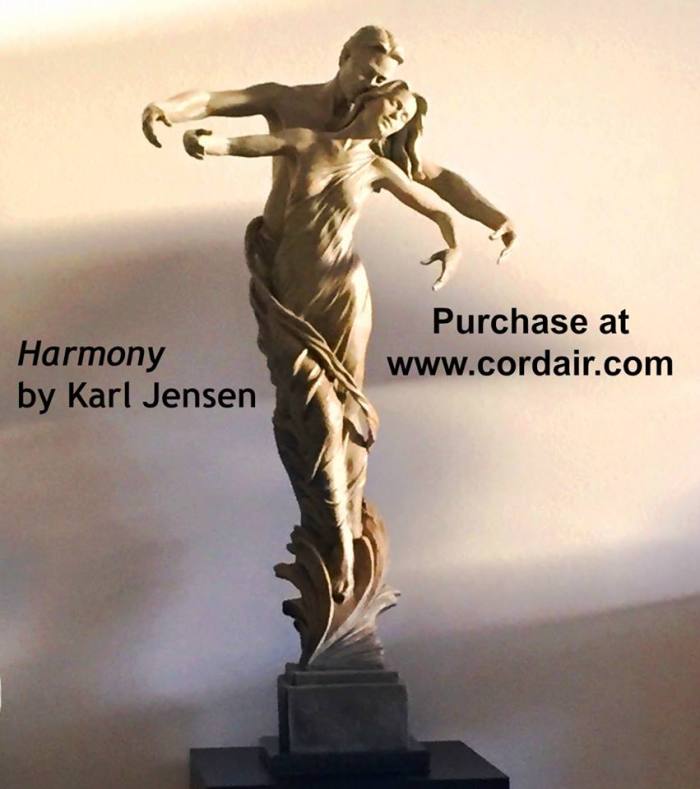

In Earthly Peace
“In Earthly Peace” is my blessing of, and reverence for, a silent night, a holy night, a sacred night ~ an earthly night. The lyrics are mine. The warm and lovely voice is Tori Anna’s. I hope you enjoy the song. Please feel free to share. I’ve included the lyrics the below. Merry Christmas, all. ~
*****
In Earthly Peace
Silent night, holy night,
Lovers lie in starlight bright,
Lips cross lips for untold things,
Limbs cross limbs for forming wings,
Rise in flight through snowfall,
Rise in flight above all.
Silent night, holy night,
Souls betwine in sacred rite,
Mind turns mind in woven dance,
Heart turns heart in spun romance,
Bodies yearn to be one,
Bodies burn to be one.
Silent night, holy night,
Break away to renew sight,
Circle out to circle in,
Parting touch to touch again,
Tears anoint veils of white,
World in waiting veiled white.
Silent night, holy night,
Love’s firstborn will see first light,
Swaddled gift on giving breast,
Cradled close in castle’s nest,
Sleep in earthly peace,
Sleep in earthly peace.
~ Quent Cordair
Copyright 2020. All rights reserved.
*****
Enjoy more of my poetry & short fiction in my latest collection, My Kingdom, now available in paperback and Kindle editions. ~
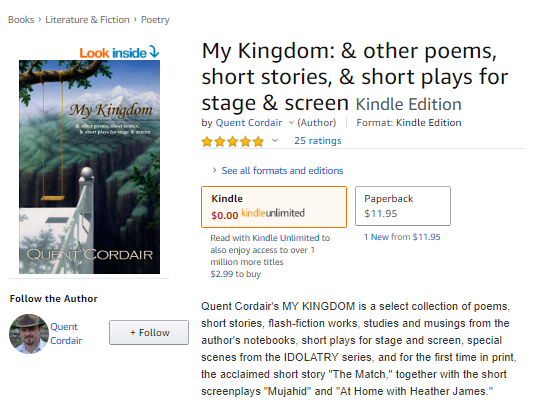
I could not put the book down! I read the poems out loud to my kids as though I am Cyrano on stage! Inspires me to be the best I can be! Love it! ~ Heather Pendaris
If you enjoy life and a positive view of mankind, if you are a valuer and enjoy reading uplifting works, you’ll love this collection of short works by Quent Cordair. This is a great book when you just want a short read that will leave you feeling better than when you started, when you need a little emotional fuel. No need to read it as a whole, just enjoy a little morsel when you need it. You will find yourself going back for more, over and over. I have thoroughly enjoyed Quent’s longer works, but they are a deeper dive. This collection can be enjoyed even if you have only short spurts of time available for reading. I highly recommend it. ~ Steve M.
I can only say, if like me you admire human independence and have a belief that each of us are sovereign individuals and that the greatest joy can be found in seeing something admirable, reward yourself with a few hours of pleasure. Buy the real book .. read … enjoy. ~ Garrett Seinen
The My Kingdom collection is now available in paperback and Kindle editions. ~

*****
If you prefer novels, I write those too. I recommend starting with Genesis, the first part of my five-part Idolatry saga. ~
Genesis
Part I of Idolatry
In the twilight of the Roman Empire, a sculptor struggles to keep an 800-year dream alive while honoring the love of his life and raising his adopted son. Part I of the epic five-part Idolatry saga, the story of a wealthy young heir and a devout Christian girl who find themselves at the heart of a 2400-year struggle for the soul of Western Civilization.

“Beautifully written, on the order of Ken Follett’s Pillars of the Earth, with the historical insight of James Michener, it brings to life a time of great thought, great art, and its clash with religious fanaticism. Cordair writes with a poet’s sense of scene and nuance and gives us a great deal of insight into the mind of a sculptor; I found this an exciting and easy read.” ~ Alan Nitikman
Enjoy Genesis in paperback, Kindle, or Audiobook today. ~
*****
Quent Cordair Fine Art, with galleries in Napa, California, and Jackson, Wyoming, was established by artist Quent Cordair in 1996. As a premier provider of contemporary Romantic Realism in painting, sculpture, and drawing, QCFA has grown to serve an international clientele of private and corporate collectors. Explore our select offerings today at cordair.com. ~


April’s Justice
The point of focus was sixty yards away, four-and-a-half feet above the ground, centered over the wheel ruts of the frozen dirt drive where the drive crested the hill. There was nothing at that point, nothing but the chill, gray December air. The air was held steadily on the tip of a bladed front sight. The blade was couched snugly in a tight “U” notch—the rear sight of a 1903 Springfield .30-06. Inside the rifle’s chamber, a small lead ball waited impatiently for a slight contraction of the muscles of the finger on the trigger. On command, the ball would spin madly out of the barrel’s biting, spiraling grooves and, within a fifteenth of a second, hiss across the short distance. Should a man happen to be walking up the drive from the road at that moment, it would be his misfortune to cross the path of the ball—with his chest.
The thought gave her satisfaction, but she didn’t smile. Her cheek was pressed hard against the rifle’s walnut stock, the occasional snowflake that landed on her face melting there, unnoticed. The cold, oil-cleaned barrel lay steadied across the top of a neat stack of firewood. Over the summer, she had bruised her shoulder again and again as from varying distances she blasted jars and tins to smithereens. The bruises were yellow now; the weapon had become familiar, a constant companion, like the quilted blanket she had carried with her everywhere as a child.
Moments earlier, she had been putting the animals away when she heard an approaching motorcar on the main road. The sound itself would have been acceptable except for its sudden cessation: the farm was the only one along the desolate nine-mile stretch of winding West Virginia road, and no one stopped here, not anymore. She waited behind the firewood, unmoving, watching the tip of the rifle’s sight for something to step into the condemned space above the crest of the drive. From the barn behind her one of the horses snorted restlessly. With her thumb she slipped off the rifle’s safety.
A hat appeared, then a head beneath it. Her pulse jumped, and she worked to slow her breathing, to steady her hands, adjusting her aim. She was unprepared for the other two hats, one rising on each side of the drive, outside the ruts. Okay, first the middle one, then the left, then the right. The magazine held five rounds—she could afford to miss only twice. She practiced the move, sliding the sight a fraction of an inch each way. No, it’s better just to go straight across—left, middle, right. She practiced the revised move twice and held her aim on the place where the chest of the man on the left would appear above the rise within two seconds, and then within one—
A shimmer of silver flashed from the middle man’s chest. She recognized the sheriff. The man on the left was Caleb, one of his deputies. She didn’t recognize the man on the right, but judging by the hat and badge, he too was a deputy. She practiced the move again—left, middle, right.
“April?” the sheriff called out. “April?” he called again, warily.
The trio slowed as they neared. They hadn’t spotted her yet. Caleb and the other deputy looked as though they expected ghosts to fly out of the cabin. Twenty yards out the men stopped, the sheriff observing the wisps of blue smoke rising from the chimney.
“April, this is Sheriff Holsapple. Come on out—I need to talk with you for a minute.”
She had never liked the way Deputy Caleb watched her body when she was in town, with that lewd twist sneaking up at the corner of his mouth. She sighted in on the spot and wondered what his face would look like without it. The trigger pressed invitingly against her finger. With the rifle trained on him, she stepped out from behind the woodpile. The blood drained from the deputies’ faces. The three men stood as frozen as the pines behind them.
The sheriff’s lips pursed wearily. His shoulders had dropped, his hands hung loose and quiet by his sides, except for the faint tracing of his right thumb which seemed to have a mind of its own. If she were going to shoot Caleb first, he might have a chance to draw. She could tell that he wasn’t sure if he would or could, that he was thinking that they really shouldn’t have come up here, that they should have just left her alone. He was right in thinking that. In the thick stillness, they all knew it.
“Come on now, April,” the sheriff ventured. “I’m only here to help.”
“I don’t need your help, Sheriff.”
He sighed. “This is important, April. Look, at least lower the gun. It’s too damned cold out here for us all to be sweatin’ like this. We’ll just stand right here, and you can stand right there, and I’ll say my piece and we’ll leave, okay?”
She lowered the muzzle of the rifle but kept her eye on Caleb as she turned towards the cabin.
“Please come in, Sheriff,” she said. “You must be thirsty.”
“Thank you, ma’am.”
Caleb exhaled, arching his eyebrows at the other deputy as if to say, “See, I told you she’s nuts!” Hesitantly, the two followed the sheriff up the steps of the porch.
Once inside, April leaned the gun against the hearth and, from the kettle on the stove, portioned what remained of the hot apple cider into three cups. The men removed their hats and sat at the sturdy oak table. She served them silently before backing away to the wall, within reach of the gun.
“April, I believe you know Caleb, and this is Tommy Shifflett, my new deputy. Tommy just moved up from Tennessee a few months ago.”
Tommy was a handsome, green-eyed young man not much older than April herself. She granted him a curt nod. Caleb received no acknowledgement.
“What’s your business, Sheriff?” she asked.
The sheriff set his cup on the table and considered his words carefully.
“Yesterday afternoon, about five miles north of here, a man got away from a Mercer County deputy who was taking him up to the Charleston prison. A posse with dogs searched the hills all night, and today we expanded the search, but he must have holed up somewhere. Now, I doubt you’ve heard, but there’s a blizzard blowing in—“
“I know.”
“Well, I expect you would, but anyway, this fella is wearing just regular clothes—no coat, hat or boots—and we figure if he wants to live through the night, he’ll likely have to come down out of the storm and find shelter.”
“And you think he’ll come here?”
“Not necessarily, but here’s as good a place as any.”
“What did he do, Sheriff?”
He glanced uncomfortably at the deputies. “The man hasn’t been convicted yet, but if the charges are serious enough to take him up to Charleston rather than risk the locals lynching him before he can be given a proper trial, then it might be prudent to—“
“Sheriff, what did he do?”
The sheriff sighed, “It doesn’t really matter, April—“
“It was murder, wasn’t it?”
“Well, yes. Yes, it was murder. . . .”
“And what else?”
He looked around the cabin as though searching for a way out, his eyes pausing momentarily on the closed door to the cabin’s only other room. When he looked her in the eye again he grimaced apologetically.
April turned away. Through the window, the snowflakes were bigger now and beginning to fall more thickly. The fire in the fireplace had died down. She laid a handful of kindling on the glowing embers and watched as a small flame leapt to life.
Shoot him, April. Shoot him now!
Caleb chuckled. “The fella’s swearing they’ve got the wrong man, but don’t they all say that? Why, just last month over in Fayetteville, the uncle of that girl who disappeared was claiming that he had only been—“
The sheriff silenced him with a swift, hard look.
April retrieved the rifle.
“Will that be all, Sheriff?”
“Yes, April, that’s all. I apologize for the interruption. Thank you for your hospitality. Come on, boys, let’s get back to town before the roads get too bad.”
The deputies filed out, the sheriff hanging back.
“You know, I’ve got a daughter your age still at home. I’m sure she would love some company. You’re more than welcome to come spend a few days. . . .” He studied her face. “Well, you know where we live if you change your mind. You take care now, April.”
Caleb chimed in from the porch. “Miss April, I’d be more than happy to stick around and keep an eye on things for you tonight—“
“—said the fox to the hen,” muttered Tommy.
Caleb punched him hard on the shoulder.
“Shut up and walk, both of you,” barked the sheriff.
April watched from the porch as the men crossed the yard.
“What’s he look like, Sheriff?”
He turned and regarded her, the undersized girl in the oversized coat with the rifle made for war.
“He’s a tall fellow with dark hair and light blue eyes. They say you can’t forget his eyes. He’s wearing a plain white shirt and brown trousers, unless he’s stolen some other clothes, and he’s got some kind of bird tattooed on his left forearm.”
The deputies’ hats disappeared first over the crest of the drive, followed by the sheriff’s. The car’s engine started and faded away into the distance.
The low clouds were coming in dark and fast from the north. The storm was going to be a bad one. The horses had sensed it. Dancer had almost thrown her that morning. She slipped the gun’s safety on and went to the barn to put out extra hay and water for the horses and cows, enough to last. In her grandfather’s day there had been a blizzard that drifted the snow so deep it had taken him three days to dig from the house to the barn. The new roof she had put on the chicken coop had yet to be tested by the weight of a winter snow: for good measure, she hauled a fence post from behind the barn and wedged it beneath the coop’s center beam. After putting out more feed and water for the chickens and pigs, she tied a burlap bag over the well’s hand pump and closed up the barn and the sheds. As she was latching the door to the chicken coop, the hens raised such a frantic cackling a person would think they were being buried alive.
There was little to be done for the cabin itself except to secure the shutters. Its sealed logs and thick planks of pine were impregnable to the harsh mountain winters. The doors and windows were tight—there wasn’t a single draft. As a child, April had felt completely safe in this house, tucked away in her bed high in the loft, though the storms had howled only a few feet above. She still slept there, on the mattress on the loft’s floor, above the bedroom now seldom entered, no longer used, its featherbed shrouded beneath the embroidered white spread, the brush and comb on the vanity untouched, lying where they had been laid.
From the porch she stood and looked beyond the yard, searching the shifting shadows of the dark and scraggly woods. Dead brown needles carpeted the stands of pine, while those yet on the trees absorbed what winter light they could, their hue a fading memory. The scattered hardwoods stood bare, each lonely and silent amidst its neighbors, limbs naked to the chilling breezes that portended the slashing winds to come.
There was a sharp crack—a branch tumbled from somewhere above, slapping and twisting across the lower limbs until it hit the ground, shattering its brittle fingers.
She reached out to find the porch post, hefting the rifle in her other hand. Let the storm come. Let the man come. She was ready. She went into the house and lowered the iron bar across the door.
* * *
After preparing and eating her dinner of squirrel stew, spoon bread and baked apples, she worked on her mending until her fingers tired, then settled into the rocker by the fire to read.
Somewhere in the English countryside, beneath a cascading willow in a flowering spring meadow, a pair of young lovers sat on a blanket plotting their elopement, but it was next to impossible for her to eavesdrop on them for more than a few sentences as the winds had begun to tear at the cabin’s eaves and to test the shutters’ latches. She laid the book aside, pulled her knees up to her chin and wrapped herself in the quilt her grandmother had made. As the minutes and hours ticked away on the clock on the mantel, she rocked, watching the fire.
The wood seemed to be burning more drily and quickly than usual. At this rate, the provision next to the hearth would be depleted by sometime the next morning, and there was less than a quarter of a cord remaining on the porch. After watching the fire awhile longer, she reluctantly extricated herself from her cocoon, donned her coat and boots, lit the lantern, and lifted the bar from the door.
The wind ripped the door from her hand and slammed it against the wall as a sheet of stinging snow whipped around her and into the house. Slinging the rifle over her shoulder, she pushed her way out, succeeding in pulling the door shut only when the wind slackened momentarily.
There was over a foot of snow on the ground already, and it had drifted twice as high against the side of the cabin. Leaning into the gale, she waded out across the yard, the driving whiteness within the sphere of her lantern’s light stinging her eyes. She brushed the accumulation from the top of the wood stack with her coat sleeve, chiding herself for not having thought to move more wood to the porch earlier in the day. One couldn’t afford to make such mistakes, living alone in the country. As she struggled to carry a dozen high armloads back to the porch, she found herself angry with the sheriff for having distracted her from her preparations, angry that he had brought Caleb along, angry with Caleb for existing—and for being possum-ugly to boot—angry with herself for allowing herself to be distracted, angry with herself for being angry. From the improved supply on the porch, she replenished the stock by the hearth and, using what strength was left in her legs, forced the door closed again. Sinking back against it, she shuddered, thoroughly soaked and chilled to the bone.
Once she had recovered sufficiently to strip out of her wet clothes and hang them from the mantle to dry, she bundled herself in the quilt and brewed a cup of sassafras tea. With the rocking chair pulled as close to the fire as she could bear, her hair dried quickly, but even after her body was warmed through, the rim of the teacup chattered against her teeth. She picked up her sewing, but her fingers wouldn’t hold steady. The wind wailed against the shutters, pressing, tugging, probing unrelentingly. She tried her book again but found her eyes drifting over and over to the beginning of the same paragraph.
There was a thudding bang from somewhere outside—from the direction of the barn perhaps. It could have been anything, a falling branch hitting the chicken coop roof or one of the horses kicking something over. She thought she had heard a whinny. Hopefully, the animals were okay, but she wasn’t going back outside, not tonight. It helped to watch the shifting patterns in the coals. The lick of the yellow and orange flames helped warm her soul as the tea warmed her bones. She needed a dog. Maybe in the springtime she could find a puppy. It would need to be a large breed, a good farm dog, maybe a shepherd or a retriever or a hound. A big cuddly mongrel would be fine.
Knock, knock, knock, knock, knock.
The tea spilled over her lap and the cup burst into pieces, scattering across the stone hearth. She froze. She couldn’t move.
Oh, my God, I have to move. I must move—now!
She stood, grabbed the rifle and swung it around to the door. She struggled momentarily to keep the quilt from falling away and exposing her body, but the priority for her hands was elsewhere. Raising the rifle to her shoulder, she clicked off the safety as the quilt dropped to the floor.
Good. That’s good, April.
Knock, knock, knock, knock, knock.
Her heart plunged—impossibly, the iron bar was leaning against the wall. She had forgotten to put it back after bringing in the wood. There was no other lock on the door. None had ever have been necessary.
Knock, knock, knock, knock, knock.
The shuttered windows precluded anyone from seeing in, but she couldn’t see out either. If she ran to bar the door, it would take both of her hands to lift and move the bar—she would have to set the rifle aside. She wasn’t going to do that. There was nothing left but for the doorknob to turn.
Shoot him, April. Shoot him now!
The fear coiled around her vision and tightened until all she could see was the doorknob, with blackness and the cursed memories closing in around it.
It had been a beautiful summer evening in the mountains, the kind of evening that made a person never want to leave. Mama had fixed a scrumptious-smelling venison roast for supper, with fresh vegetables from the garden, and Papa had just come in from his field work. The two were already seated at the table when April dashed in from a swim in the creek. She went straight to the stove and was about to serve herself a plateful of the roast when the man stepped in through the open doorway.
Strangers stopping by wasn’t a rare thing that summer. The paper said the country was in a depression, and there were plenty of men out of work. Many of them passed along the road on their way to look for a job in the mines or on their way back from learning that there weren’t any jobs to be had. Mama had fed many a hungry man in exchange for his mucking out the stalls, slopping the hogs or some other such chore. Papa wouldn’t have minded so much except that Mama never turned away anyone, regardless of any suspected or evident deficiency of character. She didn’t check after the men on their assigned work, and not a few had weaseled a meal without lifting a finger. Mama would only shrug and say, “Judge not that ye be not judged.”
Knock, knock, knock, knock, knock.
The knocking was more urgent now, the door vibrating with each sound. There was a scratch in the right edge of the doorknob’s brass. April watched the scratch intently, waiting for it to move, up or down.
The man who had walked into their house that day had looked about like any other to April, except for the scar through his eyebrow, but her father had seen something more. Unfortunately, her father was seated at the far end of the table, against the wall, in the wrong part of the room to do anything but hope that his daughter would listen to him.
“Get the rifle, April,” he had told her, quietly but firmly.
She had reached above the hearth and had taken the rifle from its place. The big bolt-action weapon was the same model her father had carried in the war. He had taught her how it operated, and she had even fired it once, though the recoil had knocked her on her back and she hadn’t touched it since. She knew enough to slide the bolt rearward and forward again to chamber a round.
“Shoot him, April. Shoot him now!”her father said.
Her mother was beyond shock. “Put that gun down, April Anne! God forgive us! Please don’t mind my husband, sir—he was in the war and sometimes—”
The man was walking towards April, watching her intently. She glanced down to make sure the safety was off.
“Shoot him, April,” her father ordered. “You have to do it now!”
She looked at her mother, then at the approaching man. She raised the rifle and pointed it. Her finger trembled but wouldn’t pull the trigger. She started crying. “Papa, I can’t!”
The man grabbed the rifle from her hands and chuckled. “Should have listened to your old man, young lady.” He swept the gun around and shot her father through the chest. “And a woman as saintly and charitable as your dear mother here must be looking forward to meeting her maker too.” He shot her and watched her crumple to the floor before turning to April.
“Now, don’t you worry, angel—” he took her chin in his hand—“I’m going to take you on a little trip to heaven too, and if you behave yourself, you’re gonna live to remember it for a long, long time. I think I’d like that.”
She refused to remember the rest.
Knock, knock, knock, knock, knock.
I’m ready this time, Papa. Oh yes, I’m ready.
She was glad she had left the bar off the door. She wanted to shoot him. She needed it. Her mouth was dry. Why hadn’t the scratch moved? How long had he been knocking? She glanced at the clock. It was a quarter after eleven. All you’ve got to do is turn the knob, bastard.
The gun was heavy, her arms were tiring. Without taking her eye or aim off of the door, she pulled the rocking chair around, rested her foot on the seat and supported her elbow on her knee.
A posse had caught up with the man with the scarred eyebrow three days later. They hung him on the spot and left him swinging. When April found out, she rode the twenty miles to the place alone and shot five holes through the body. It hadn’t helped.
The townspeople attended the burial of her parents beneath the oak in the south meadow. She hadn’t told anyone what the man had done to her, but they all knew. She saw it in their eyes and heard it in their voices whenever she had to go into town. The young men were the worst, the way they watched her body, imagining themselves in the man’s place.
It was twenty-five after the hour. There had been no knocking in the last ten minutes. Had he gone to the barn to look for a weapon? He could be returning to the cabin with the ax by now. Maybe it wasn’t the murderer. But no one in his right mind, probably not even Caleb, would be out in this storm. She dried her palms on her bare leg and waited.
Five minutes more and she could stand it no longer. She dared to lean the rifle against the rocker for just long enough to slip back into her clothes, which were still damp.
“Who is it?” she called, approaching the door.
There was no answer.
“Who’s there?”
Only the wind answered. Taking a deep breath, she reached for the doorknob and, in a single swift motion, turned it, pulled, and leapt back to aim.
The only thing at the door was the storm. She peered out. The snow was freshly scuffled on the porch. Someone had been there, but she could see nothing more through the blowing curtain of white. Hurriedly she slipped on her coat and lit the lantern. He wasn’t going to get away this easily, not this time. He was too close to get away. She ventured out into the night, lantern held high, the rifle tucked under her arm.
Though the wind was drifting the snow too fiercely for anything like footprints to survive for long, there remained a faint trail, a shallow trench leading away into the blackness beyond the lantern’s light. She followed it in the direction of the barn for several yards and looked behind her. The house was already lost in the darkness and her own steps were quickly being covered. She squinted, blinking against the crystals forming on her eyelashes, already regretting not having changed into thoroughly dry clothes. She had to hurry. A few years ago there was a man in the valley who, in a blizzard not unlike this one, had wandered in circles for hours before dying only twenty feet from his own door. She couldn’t see more than two or three feet in front of her or behind.
The tracks veered to the left and seemed to miss the barn altogether, if her sense of direction and distance still served her, but the shallow impressions were becoming indistinguishable in the blowing drifts. She was thinking that she was heading down the hill in the direction of the creek when she tripped over something and fell headlong, dropping the rifle and the lantern as she went down. She knew what the thing was before she hit the ground. Mercifully, the lantern landed relatively upright in a snowbank and stayed lit. She scrambled for the rifle, digging it out of the snow and turning it on the object.
The thing was indeed the body of a man. He was lying face down. The snow had drifted up over his windward side. She poked at his ribs with the rifle. He didn’t move. With the rifle’s muzzle, she scraped away some of the snow from his back. He wore no coat. His shirt was white, his trousers brown. She scraped the snow from his left arm and, still employing only the muzzle, pushed up the shirt sleeve. The skin, blanched of most of its color, provided a stark field of contrast to the small, stylishly crafted tattoo of a falcon.
Shoot him, April. Shoot him now!
“Yes, Papa….”
She lowered the muzzle into the curls of dark hair on the back of the man’s head. A thought tried to cross her mind, but she forced it away. Laughing aloud, she said to the night—
“This is for Papa, and for Mama, and for me.”
The frozen trigger felt blood-warm against her finger. The nightmare would now be over. She felt the mechanism’s resistance and the familiar give. The same thought tried to surface again but it was easier to ignore the second time.
But there was a different fear now, a tiny thing struggling to be heard, like the faint cracking in a mine before its collapse. The warning was of something worse than what the other man had done to her, worse than what any man could do—and she was doing it to herself. She sensed the danger, the imminent shredding, crushing and burying of the innermost workings of her mind, a crippling such that it would never work the same for her once the damage had been done. With the pull of the trigger, a part of her soul would die, and she would never be the kind of woman she had always aspired to be. She couldn’t escape it, she couldn’t deny it: if she killed the thought with the man, she might as well then turn the gun on herself. She considered it.
She hated to do it—hated it so much that it made her scream aloud—but with the scream she willed the thought to mind:
He hadn’t turned the doorknob.
Not having her consent, this accused murderer and rapist had refused to attempt to enter her home, even though the alternative meant his possibly freezing to death. He hadn’t even turned the doorknob. He hadn’t turned the knob. . . .
She leaned down and brushed the snow from his face. His eyebrows and eyelashes were encrusted with ice. His cheeks and lips were colorless. She knelt and put her ear to his back. His heart was still beating.
She laid the gun aside and set the lantern in the snow.
* * *
It was another late evening on another winter day, and April was sitting in the rocking chair by the fire, doing her sewing. Over the years, eight additional rooms had been built around the cabin’s original two, but it was the same rocking chair and the same fire. Her granddaughter, Cindy, sat on the sofa next to the rocker, sipping sassafras tea and staring moodily into the embers. Cindy was seventeen now, the second daughter of April’s third son.
“What’s the matter, honey?” April ventured.
“Nothing, Grandma.”
“I’m thinking it’s probably something.”
Cindy only sighed.
“Boy trouble again?”
Cindy frowned into her tea. “Grandma, there just aren’t any good men left out there. Every time I think I’ve got the right one, he turns out to be something different altogether. If he’s not lying to you outright or trying to take advantage of you, he’s putting on some kind of a front. You just can’t trust them. I hate men.”
April smiled to herself. She had been a year younger than Cindy that fateful night, thinner and shorter too. It had taken her over an hour to carry, roll and drag the man to the porch, up the steps and into the house, where she had stripped off his clothes and thawed him by the fire. To stay awake, she had spent the hours until dawn guessing at what his name might be, imagining nearly every one but the right one, as it turned out. It wasn’t until early afternoon of the next day that he finally began to stir. As she waited for him to open his eyes, she was holding the blade of the kitchen knife against his throat, just in case. In her other hand was a cup of hot broth.
“Would you like to hear a story, Cindy?”
Cindy perked up. “Sure, Grandma!”
“Shhh, we must keep our voices down or we’ll—”
But it was too late. Grandpa had been snoring softly in his recliner, an open book lying on his chest. His chin had nodded at the sound of their voices. He opened his eyes. Seeing the way his wife was looking at him, he smiled and dozed off again. She had hidden him away for two months, until the crime was confessed by a former farmhand of the victims. And every time he opened those eyes, April fell in love with her Justice all over again.
“Cindy,” she asked softly, “have I ever told you the story of how I met your grandpa?”
* * *
*
“April’s Justice” is from my Lunch Break collection of poems and short stories, now available in paperback and Kindle editions.
“Well worth the price. If you haven’t read any of Quent’s stories yet, I almost envy you. I’m waiting eagerly for more.” – Dianne Durante, author of the *Forgotten Delights* series
“Could you read these during your lunch break? Yes. Will you want to? No. You won’t want to rush yourself. You’ll want to pour yourself a glass of wine, snuggle into your favorite chair, turn off your phone, and spend every luxurious minute that you can immersing yourself in these stories.” – Elizabeth O’Brien, author of *English Grammar Revolution*
“…it is fuel for the spirit; it is an affirmation of life and what is good. That he writes beautifully and imaginatively adds to the reading pleasure.” – Michael Wilkinson, Sculptor
Enjoy more of my poetry & short fiction in my latest collection, My Kingdom, now available in paperback and Kindle editions. ~
I could not put the book down! I read the poems out loud to my kids as though I am Cyrano on stage! Inspires me to be the best I can be! Love it! ~ Heather Pendaris
If you enjoy life and a positive view of mankind, if you are a valuer and enjoy reading uplifting works, you’ll love this collection of short works by Quent Cordair. This is a great book when you just want a short read that will leave you feeling better than when you started, when you need a little emotional fuel. No need to read it as a whole, just enjoy a little morsel when you need it. You will find yourself going back for more, over and over. I have thoroughly enjoyed Quent’s longer works, but they are a deeper dive. This collection can be enjoyed even if you have only short spurts of time available for reading. I highly recommend it. ~ Steve M.
I can only say, if like me you admire human independence and have a belief that each of us are sovereign individuals and that the greatest joy can be found in seeing something admirable, reward yourself with a few hours of pleasure. Buy the real book .. read … enjoy. ~ Garrett Seinen
The My Kingdom collection is now available in paperback and Kindle editions. ~
*****
If you prefer novels, I write those too. I recommend starting with Genesis, the first part of my five-part Idolatry saga. ~
Genesis
Part I of Idolatry
In the twilight of the Roman Empire, a sculptor struggles to keep an 800-year dream alive while honoring the love of his life and raising his adopted son. Part I of the epic five-part Idolatry saga, the story of a wealthy young heir and a devout Christian girl who find themselves at the heart of a 2400-year struggle for the soul of Western Civilization.
“Beautifully written, on the order of Ken Follett’s Pillars of the Earth, with the historical insight of James Michener, it brings to life a time of great thought, great art, and its clash with religious fanaticism. Cordair writes with a poet’s sense of scene and nuance and gives us a great deal of insight into the mind of a sculptor; I found this an exciting and easy read.” ~ Alan Nitikman
Enjoy Genesis in paperback, Kindle, or Audiobook today. ~
*****
Quent Cordair Fine Art, with galleries in Napa, California, and Jackson, Wyoming, was established by artist Quent Cordair in 1996. As a premier provider of contemporary Romantic Realism in painting, sculpture, and drawing, QCFA has grown to serve an international clientele of private and corporate collectors. Explore our select offerings today at cordair.com. ~
No Sea Was Ever Sailed
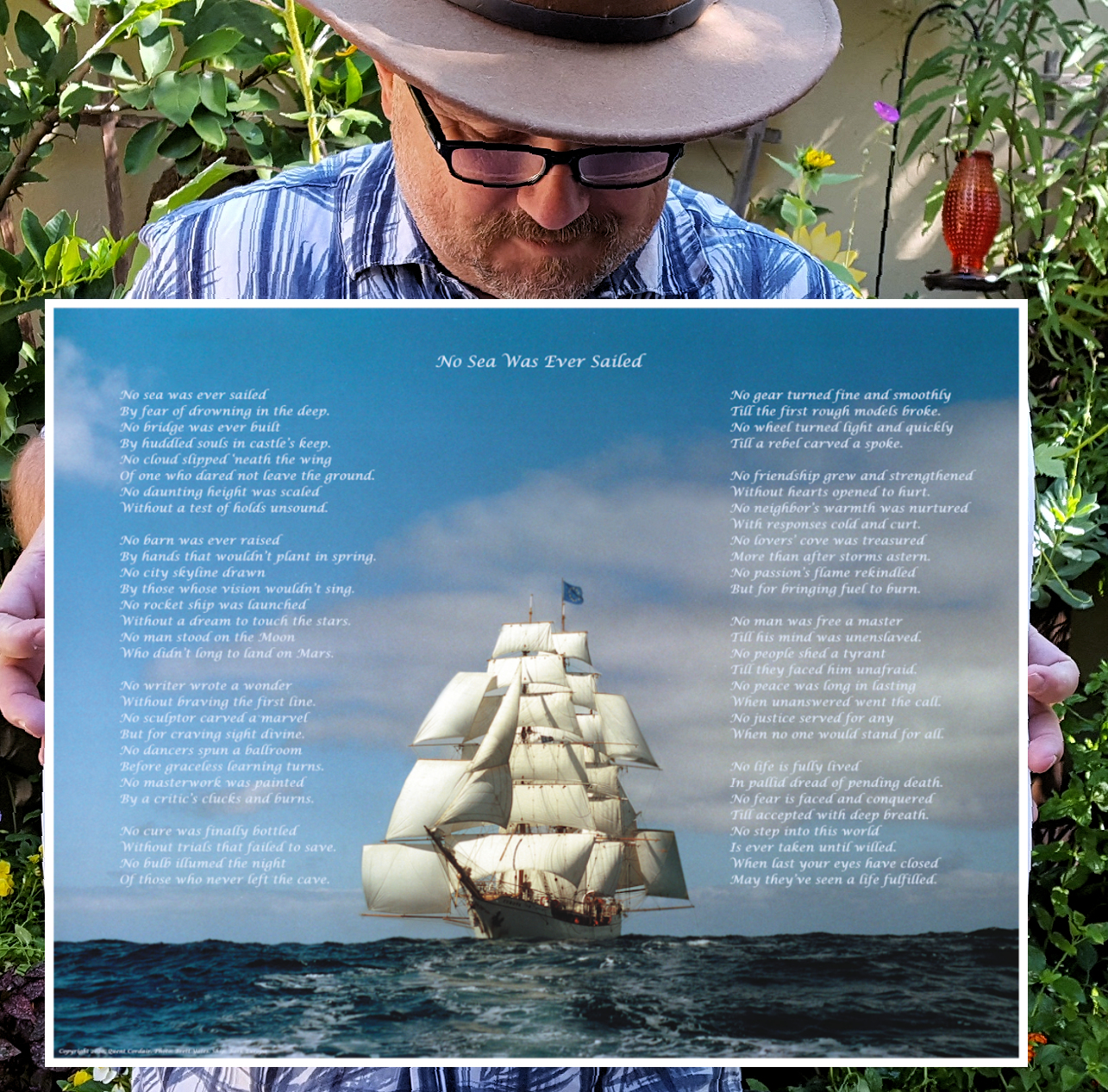
I love it. I’m signing each one. The first proof of “No Sea Was Ever Sailed” is in, and I couldn’t be more pleased. Printed on sturdy, high-quality watercolor paper, 16″ x 20,” great for framing, gifting. cordair.com/artists/cordai
No Sea Was Ever Sailed
No sea was ever sailed
By fear of drowning in the deep.
No bridge was ever built
By huddled souls in castle’s keep.
No cloud slipped ‘neath the wing
Of one who dared not leave the ground.
No daunting height was scaled
Without a test of holds unsound.
No barn was ever raised
By hands that wouldn’t plant in spring.
No city skyline drawn
By those whose vision wouldn’t sing.
No rocket ship was launched
Without a dream to touch the stars.
No man stood on the Moon
Who didn’t long to land on Mars.
No writer wrote a wonder
Without braving the first line.
No sculptor carved a marvel
But for craving sight divine.
No dancers spun a ballroom
Before graceless learning turns.
No masterwork was painted
By a critic’s clucks and burns.
No cure was finally bottled
Without trials that failed to save.
No bulb illumed the night
Of those who never left the cave.
No gear turned fine and smoothly
Till the first rough models broke.
No wheel turned light and quickly
Till a rebel carved a spoke.
No friendship grew and strengthened
Without hearts opened to hurt.
No neighbor’s warmth was nurtured
With responses cold and curt.
No lovers’ cove was treasured
More than after storms astern.
No passion’s flame rekindled
But for bringing fuel to burn.
No man was free a master
Till his mind was unenslaved.
No people shed a tyrant
Till they faced him unafraid.
No peace was long in lasting
When unanswered went the call.
No justice served for any
When no one would stand for all.
No life is fully lived
In pallid dread of pending death.
No fear is faced and conquered
Till accepted with deep breath.
No step into this world
Is ever taken until willed.
When last your eyes have closed
May they’ve seen a life fulfilled.
~ Quent Cordair
Purchase one or more signed prints of “No Sea Was Ever Sailed” at
https://cordair.com/artists/cordair/works/no-sea-was-ever-sailed/index.html
*****
Enjoy more of my poetry & short fiction in my latest collection, My Kingdom, now available in paperback and Kindle editions. ~
I could not put the book down! I read the poems out loud to my kids as though I am Cyrano on stage! Inspires me to be the best I can be! Love it! ~ Heather Pendaris
If you enjoy life and a positive view of mankind, if you are a valuer and enjoy reading uplifting works, you’ll love this collection of short works by Quent Cordair. This is a great book when you just want a short read that will leave you feeling better than when you started, when you need a little emotional fuel. No need to read it as a whole, just enjoy a little morsel when you need it. You will find yourself going back for more, over and over. I have thoroughly enjoyed Quent’s longer works, but they are a deeper dive. This collection can be enjoyed even if you have only short spurts of time available for reading. I highly recommend it. ~ Steve M.
I can only say, if like me you admire human independence and have a belief that each of us are sovereign individuals and that the greatest joy can be found in seeing something admirable, reward yourself with a few hours of pleasure. Buy the real book .. read … enjoy. ~ Garrett Seinen
The My Kingdom collection is now available in paperback and Kindle editions. ~
*****
If you prefer novels, I write those too. I recommend starting with Genesis, the first part of my five-part Idolatry saga. ~
Genesis
Part I of Idolatry
In the twilight of the Roman Empire, a sculptor struggles to keep an 800-year dream alive while honoring the love of his life and raising his adopted son. Part I of the epic five-part Idolatry saga, the story of a wealthy young heir and a devout Christian girl who find themselves at the heart of a 2400-year struggle for the soul of Western Civilization.
“Beautifully written, on the order of Ken Follett’s Pillars of the Earth, with the historical insight of James Michener, it brings to life a time of great thought, great art, and its clash with religious fanaticism. Cordair writes with a poet’s sense of scene and nuance and gives us a great deal of insight into the mind of a sculptor; I found this an exciting and easy read.” ~ Alan Nitikman
Enjoy Genesis in paperback, Kindle, or Audiobook today. ~
*****
Quent Cordair Fine Art, located in beautiful Napa, California, was established by artist Quent Cordair in 1996. As a premier provider of contemporary Romantic Realism in painting, sculpture, and drawing, QCFA has grown to serve an international clientele of private and corporate collectors. Explore our select offerings today at cordair.com. ~
“Between Venus & Mars” & more ~
The Poetry of Quent Cordair

Between Venus and Mars
Crickets below, dippers above,
Night rising cool around the foxglove,
Floor of warm stone, ceiling of stars,
Jewel on the ring between Venus and Mars.
You’ll find my address between Venus and Mars.
Striding the plain, mountains surround,
Strove to find flight, broke the earthbound,
Made from this place, evolved and sublime,
Blessedly born and right for the time,
Mastering all but the passage of time.
Tick the count down until thunder and burn,
Children will fly, no thought of return,
While I remain, wave to their wave,
Watching them wing from the home of the brave.
I’ll keep the lights lit on the home of the brave.
*****

My Kingdom
My kingdom has no subjects,
No serfs, their backs to bear
The weight of lives of others;
None here are forced to share.
A kingdom filled with kings and queens,
Their castles great and small,
With princes blue, princesses true,
Good dogs to guard them all.
A kingdom built with brains and brawn,
Each year less brawn than brains;
We sow and reap, invent machines
That till the fertile plains.
We sail and dream, we wing the skies,
Beguile with arts refined;
We trade for riches far and near,
Hold forth in courts of mind.
We mine and dine, automatize
The tasks that bore to tears;
Our engineers, second to none,
Lean back and toast to cheers.
Our six policemen quite suffice;
We’ve seven hard Marines
And thirteen jets with bombs so smart
That no one intervenes.
We welcome independent souls,
No honest man we shun—
Our markets thrive on goods well made,
On services well done.
Be immigrant or passing guest,
As equals all we greet;
New buyers all, new sellers some,
New friends and loves to meet.
My kingdom has no subjects,
No serfs, their backs to bear
The weight of lives of others—
Come join us if you dare.
*****
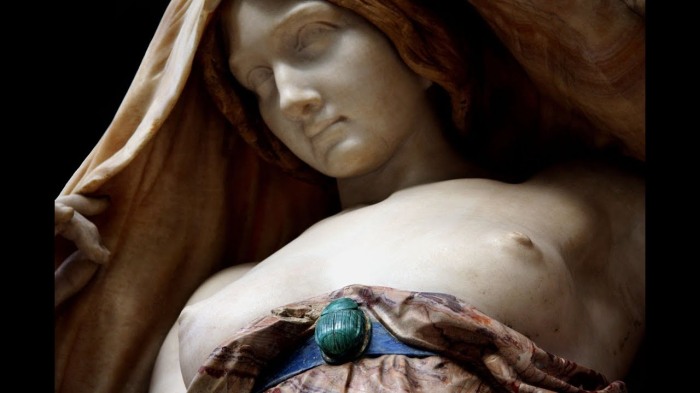
Now and Then
The fractured image flickering over the millennia,
broken and begrimed,
Healing for brief seconds, a few minutes,
now and then—
The wholeness, the clean, bright view, coming suddenly
visible again
Through the curtaining Dark—
And the Age of Man
yet lives.
*****

Spirited Gods
Spirited gods of body and mind,
Cleaving the earth and taking the find,
Arranging the atoms above in a bend,
Beneath which to dine, to dance, and attend
To desirable ends and needful things,
Burning the coal, inventing the wings
Upon which to soar like winged beasts do,
While raising fat herds for the savory stew,
Weaving silk threads, carving bone combs,
Harvesting timber for warm and dry homes,
Gathering the knowledge to hold in one hand,
On tablets of plastic and metal and sand,
Harnessing horses and nuclear parts;
Rocket plumes rise over rickety carts;
From building mud huts to high towers of glass,
From warring with spears to debating with class,
Climbing from caves to the moon and to Mars,
Masters of nature, eyeing the stars.
*****
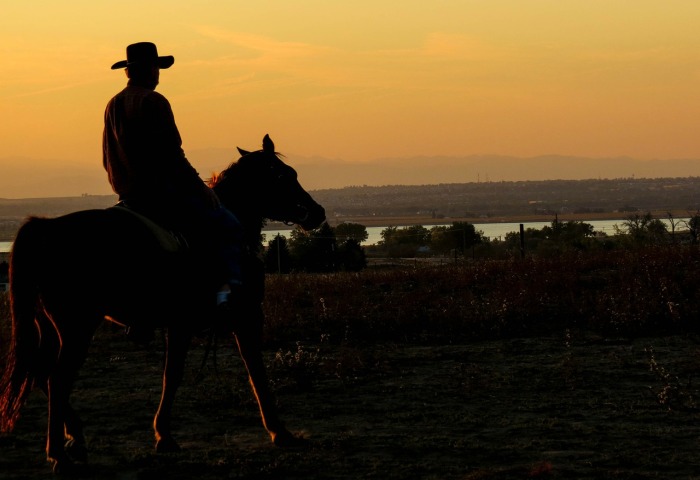
The Independent Power
For the sucker born each minute
There’s a con born every hour,
But blessedly each day is born
The independent power
Who’s neither host nor parasite,
Who’s neither lord nor bower,
Who keeps his mind with sober art,
Before no king would cower;
He earns his take and pays his due—
A man, a sovereign tower.
*****

At Last
It matters not which border crossed,
From desert dry or tempest tossed,
To waves of grain and freedom’s sigh,
From womb’s dark hold to first-light’s cry—
You’re here, you’re here, at last.
It matters not what age you came,
Eight months or eighty years, the same,
What color skin your parents’ face,
What faith from which they fled to grace—
You’re here, you’re here, at last.
Now eye to eye, measuring minds,
The hopeful search for justice finds
No honest man can blindly curse
One more like he in chorus and verse
Than different—yes, in essence we
Are species same, from nose to knee—
As equals born with equal right
To live and work and dream the night
Where best we may, and here you are,
Your place of birth be near or far,
Your life and loves as dear to you
As mine to me—and this is true:
As innocent till guilty proved,
Against you none are justly moved.
So come, let’s toast to freedom’s song,
And may someday you pass along—
It matters not which border crossed,
To nurse’s hands or shoreline lost—
You’re here, you’re here, at last.
*****

No Sea Was Ever Sailed
No sea was ever sailed
By fear of drowning in the deep.
No bridge was ever built
By huddled souls in castle’s keep.
No cloud slipped ‘neath the wing
Of one who dared not leave the ground.
No daunting height was scaled
Without a test of holds unsound.
No barn was ever raised
By hands that wouldn’t plant in spring.
No city skyline drawn
By those whose vision wouldn’t sing.
No rocket ship was launched
Without a dream to touch the stars.
No man stood on the Moon
Who didn’t long to land on Mars.
No writer wrote a wonder
Without braving the first line.
No sculptor carved a marvel
But for craving sight divine.
No dancers spun a ballroom
Before graceless learning turns.
No masterwork was painted
By a critic’s clucks and burns.
No cure was finally bottled
Without trials that failed to save.
No bulb illumed the night
Of those who never left the cave.
No gear turned fine and smoothly
Till the first rough models broke.
No wheel turned light and quickly
Till a rebel carved a spoke.
No friendship grew and strengthened
Without hearts opened to hurt.
No neighbor’s warmth was nurtured
With responses cold and curt.
No lovers’ cove was treasured
More than after storms astern.
No passion’s flame rekindled
But for bringing fuel to burn.
No man was free a master
Till his mind was unenslaved.
No people shed a tyrant
Till they faced him unafraid.
No peace was long in lasting
When unanswered went the call.
No justice served for any
When no one would stand for all.
No life is fully lived
In pallid dread of pending death.
No fear is faced and conquered
Till accepted with deep breath.
No step into this world
Is ever taken until willed.
When last your eyes have closed
May they’ve seen a life fulfilled.
*****

To Your You Being You
To the best that’s within you,
To your lift and your try,
To your will to see dawn,
To your laugh while you cry,
To your hope through the sorrow,
To your float over pain,
To your push through the dark,
To your dance in the rain,
To your rise from the ash,
To your straightening the bend,
To your fire to the lie,
To your go till the end,
To your cutting the knot,
To your swearing anew,
To your mind of your own,
To your you being you.
*****
Enjoy more of my poetry & short fiction in my latest collection, My Kingdom, now available in paperback and Kindle editions. ~
I could not put the book down! I read the poems out loud to my kids as though I am Cyrano on stage! Inspires me to be the best I can be! Love it! ~ Heather Pendaris
If you enjoy life and a positive view of mankind, if you are a valuer and enjoy reading uplifting works, you’ll love this collection of short works by Quent Cordair. This is a great book when you just want a short read that will leave you feeling better than when you started, when you need a little emotional fuel. No need to read it as a whole, just enjoy a little morsel when you need it. You will find yourself going back for more, over and over. I have thoroughly enjoyed Quent’s longer works, but they are a deeper dive. This collection can be enjoyed even if you have only short spurts of time available for reading. I highly recommend it. ~ Steve M.
I can only say, if like me you admire human independence and have a belief that each of us are sovereign individuals and that the greatest joy can be found in seeing something admirable, reward yourself with a few hours of pleasure. Buy the real book .. read … enjoy. ~ Garrett Seinen
The My Kingdom collection is now available in paperback and Kindle editions. ~
*****
Or if you prefer novels, I write those too. I recommend starting with Genesis, the first part of my five-part Idolatry saga. ~
Genesis
Part I of Idolatry
In the twilight of the Roman Empire, a sculptor struggles to keep an 800-year dream alive while honoring the love of his life and raising his adopted son. Part I of the epic five-part Idolatry saga, the story of a wealthy young heir and a devout Christian girl who find themselves at the heart of a 2400-year struggle for the soul of Western Civilization.
“Beautifully written, on the order of Ken Follett’s Pillars of the Earth, with the historical insight of James Michener, it brings to life a time of great thought, great art, and its clash with religious fanaticism. Cordair writes with a poet’s sense of scene and nuance and gives us a great deal of insight into the mind of a sculptor; I found this an exciting and easy read.” ~ Alan Nitikman
Enjoy Genesis in paperback, Kindle, or Audiobook today. ~
*****
Quent Cordair Fine Art, located in beautiful Napa, California, was established by artist Quent Cordair in 1996. As a premier provider of contemporary Romantic Realism in painting, sculpture, and drawing, QCFA has grown to serve an international clientele of private and corporate collectors. Explore our select offerings today at cordair.com. ~
No Sea Was Ever Sailed
*****
No sea was ever sailed
By fear of drowning in the deep.
No bridge was ever built
By huddled souls in castle’s keep.
No cloud slipped ‘neath the wing
Of one who dared not leave the ground.
No daunting height was scaled
Without a test of holds unsound.
No barn was ever raised
By hands that wouldn’t plant in spring.
No city skyline drawn
By those whose vision wouldn’t sing.
No rocket ship was launched
Without a dream to touch the stars.
No man stood on the Moon
Who didn’t long to land on Mars.
No writer wrote a wonder
Without braving the first line.
No sculptor carved a marvel
But for craving sight divine.
No dancers spun a ballroom
Before graceless learning turns.
No masterwork was painted
By a critic’s clucks and burns.
No cure was finally bottled
Without trials that failed to save.
No bulb illumed the night
Of those who never left the cave.
No gear turned fine and smoothly
Till the first rough models broke.
No wheel turned light and quickly
Till a rebel carved a spoke.
No friendship grew and strengthened
Without hearts opened to hurt.
No neighbor’s warmth was nurtured
With responses cold and curt.
No lovers’ cove was treasured
More than after storms astern.
No passion’s flame rekindled
But for bringing fuel to burn.
No man was free a master
Till his mind was unenslaved.
No people shed a tyrant
Till they faced him unafraid.
No peace was long in lasting
When unanswered went the call.
No justice served for any
When no one would stand for all.
No life is fully lived
In pallid dread of pending death.
No fear is faced and conquered
Till accepted with deep breath.
No step into this world
Is ever taken until willed.
When last your eyes have closed
May they’ve seen a life fulfilled.
~ Quent Cordair
*****
Signed prints of “No Sea Was Ever Sailed,” on quality watercolor paper, are now available for purchase at https://cordair.com/artists/gifts/works/no-sea-was-ever-sailed/index.html
For more information or to order your print of “No Sea Was Ever Sailed,” please visit the gallery ordering page today ~
*******
Enjoy more of my poetry & short fiction in my latest collection, My Kingdom, now available in paperback and Kindle editions. ~
I could not put the book down! I read the poems out loud to my kids as though I am Cyrano on stage! Inspires me to be the best I can be! Love it! ~ Heather Pendaris
If you enjoy life and a positive view of mankind, if you are a valuer and enjoy reading uplifting works, you’ll love this collection of short works by Quent Cordair. This is a great book when you just want a short read that will leave you feeling better than when you started, when you need a little emotional fuel. No need to read it as a whole, just enjoy a little morsel when you need it. You will find yourself going back for more, over and over. I have thoroughly enjoyed Quent’s longer works, but they are a deeper dive. This collection can be enjoyed even if you have only short spurts of time available for reading. I highly recommend it. ~ Steve M.
I can only say, if like me you admire human independence and have a belief that each of us are sovereign individuals and that the greatest joy can be found in seeing something admirable, reward yourself with a few hours of pleasure. Buy the real book .. read … enjoy. ~ Garrett Seinen
The My Kingdom collection is now available in paperback and Kindle editions. ~
*****
If you prefer novels, I write those too. I recommend starting with Genesis, the first part of my five-part Idolatry saga. ~
Genesis
Part I of Idolatry
In the twilight of the Roman Empire, a sculptor struggles to keep an 800-year dream alive while honoring the love of his life and raising his adopted son. Part I of the epic five-part Idolatry saga, the story of a wealthy young heir and a devout Christian girl who find themselves at the heart of a 2400-year struggle for the soul of Western Civilization.
“Beautifully written, on the order of Ken Follett’s Pillars of the Earth, with the historical insight of James Michener, it brings to life a time of great thought, great art, and its clash with religious fanaticism. Cordair writes with a poet’s sense of scene and nuance and gives us a great deal of insight into the mind of a sculptor; I found this an exciting and easy read.” ~ Alan Nitikman
Enjoy Genesis in paperback, Kindle, or Audiobook today. ~
*****
Quent Cordair Fine Art, located in beautiful Napa, California, was established by artist Quent Cordair in 1996. As a premier provider of contemporary Romantic Realism in painting, sculpture, and drawing, QCFA has grown to serve an international clientele of private and corporate collectors. Explore our select offerings today at cordair.com. ~
Someday
“But in your worst and darkest moments, remember that you have seen another kind of world. Remember that you can reach it whenever you choose to see. Remember that it will be waiting and that’s real, it’s possible — it’s real.” ~ Ayn Rand, The Fountainhead
Someday
Life is short, it’s oft remarked,
Too short, they’ll say, and drift another day,
Mile markers passing, gravestones fey,
Dreams once held like children dear
Last seen along the desert way,
Standing on the baked road shoulder,
Staring in mute disbelief at the pulling away,
Awaiting the change of heart, surely,
A regretful glance back, at least—
Left, dry-eyed and hopeful, with nothing
But to watch the defining lines of intent
Merge and melt into the distant liquid lure,
The languorous placidity that laps against
The morrow and morrow,
The eternal someday into which
The only one who might ever return for them
has disappeared.
~ Quent Cordair
14 May 2020
Enjoy more acclaimed Cordair poetry & short fiction in My Kingdom, now available in paperback and Kindle editions.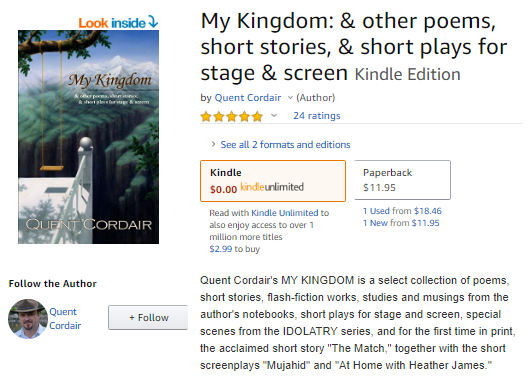
Still the Angels
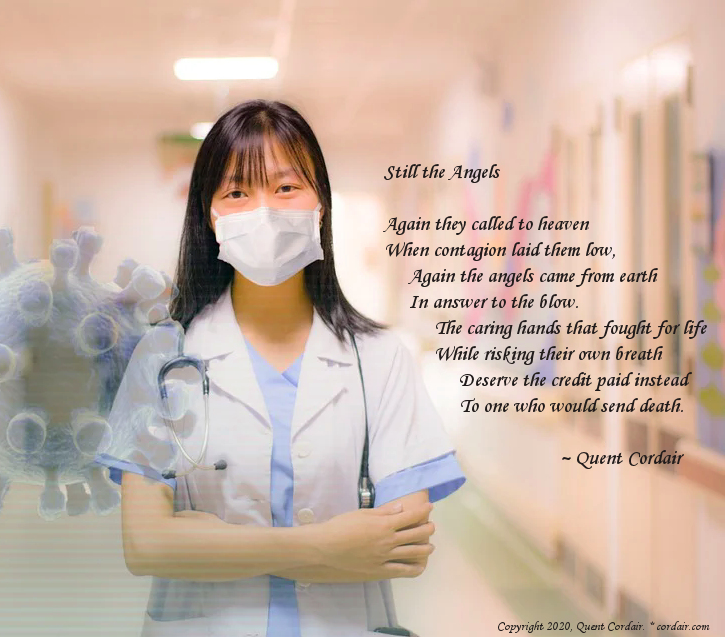
The Robin’s Nest
*****
“You seek love,” Amelie said, finally, emerging from her long silence. She was studying a ladybug that had lit on the hem of her skirt to wind its way purposefully, probingly along the line of silk stitches. She hadn’t once glanced at Catherine since they’d stopped to sit on the garden bench. “Love is always worth finding, yes,” she continued, “but it is trust I want. If only I might trust again. Trust is more precious than love, you know, more essential. Love depends on trust. Without trust, love is helpless. But with trust, love can soar. Oh, and how love can soar! Only let me find trust again.”
The ladybug paused. It opened its wings once, twice. When it flew, Amelie’s breath caught, her fingers opened reflexively, as though to catch and hold the tiny creature, but her hands remained firmly in her lap, her back straight, head erect as she followed its flight until it was lost in the buzzing haze. She pressed on, the words coming like an intoned rite over the laying of flowers on a fresh grave.
“When trust is broken, when trust is shattered, love can only stare in dumb wonder at the shards of its own reflection, rendered helpless again. When trust has crumbled into dust, to be carried off by the wind, love may persist, love may live on, but it can exist only as a bloodless shade, veiled in torn longing, shrouded in aching need, condemned to floating through the empty and echoing rooms, retracing the steps over and over, touching all the places again and again until the boards and posts are worn and polished smooth. When trust is gone, yes, love may live on, refusing to die, unable to depart, the unevictable tenant of a broken and empty heart.”
Her eyes had remained dry, the tears all long ago cried.
Catherine shifted closer and slipped her arm through, taking Amelie’s hand. “I’m sorry. I didn’t know.”
Amelie didn’t pull away.
They sat just so for a while, silently, watching the bees work the crepe myrtle tree, flower by flower, the robin building her nest, twig by twig. When they spoke again, it was of things of much and little consequence, but nothing of love or trust. They talked together until the shadows grew long and the primroses were opening to the evening dew. As the rhythm of the crickets’ song enveloped them, they fell into another long silence, a silence as natural and right as the first had been awkward and strained.
“We should be getting back,” Catherine suggested, with little conviction and less desire. “We’ll be missed.” She felt a faint tightening in Amelie’s fingers.
“If we must.”
Still, neither of the young women rose, neither moved, neither wanting to risk breaking the spell, the spell with its suggestion of a possibility of something so unlikely that it might exist only in their imaginations, a possibility neither of them had anticipated, much less dared hope.
But in a moment that had passed unnoticed that afternoon, the prospect of a better, brighter existence in the world had been conceived. Somewhere within a warm and hidden fold of the make-shift womb of clasped palms and interlaced fingers, the seed of something wondrous and impossible had germinated and begun to take form. To many in their respective worlds, to most perhaps, what these two might dare hope to claim in that twilight hour would seem too meager a treasure, a coin too common, a half farthing one mightn’t bother to stoop to retrieve had it fallen in a gutter. But for these two who had seen so much, two who had suffered more than any two should, two who had endured more than most could—two who had managed to survive in near complete isolation, on little more than sheer will, stripped of any and all hope—what they might possess in the moment, even if it proved only fleeting in the end and gone on the morrow, was enough.
In the last of the twilight, as they walked back to the manor, they were arm in arm, holding hands still, neither of them caring much at all, in truth, whether they had been missed. Consequences be damned. Before parting, they promised they would return on the afternoon next, to the bench at the end of the garden, to the sacred privacy of the primroses and crepe myrtle, to check on the robin.
It was only after they had parted, after Amelie had disappeared from view around the corner of the stables, that Catherine’s legs folded beneath her. She sat in the middle of the path, one hand holding her body off the ground, the other clutched to her heart.
Though Amelie’s tears had all long been cried, Catherine’s first had yet to be shed. Her tears flowed now, the first and the rest.
She might have found a friend.
*****
***
Thanks for reading. I hope you enjoyed the story. “The Robin’s Nest” is from the My Kingdom collection of flash fiction, short stories, poems, and short plays for stage & screen, now available in paperback and Kindle editions. ~

Save the Tigers (free fiction)
Judging from my social-media feeds, some of my friends are either reaching the bottom of their entertainment barrel or have already poked right through the bottom and started digging. (I wouldn’t name any of the TV shows being mentioned, but let’s just say that even the tigers are reportedly embarrassed to be in one of them.)
Let me help. I’m going to start making some of my 5-star fiction free to download, for a limited time, to help get us through these surreal days with minds and souls intact. I’ve made “Mujahid” a complimentary download through midnight Pacific tomorrow, April 5, 2020. You can read it on any smartphone, iPad, laptop, or desktop using Amazon’s Kindle app.
 A wonderful new review of “Mujahid”:
A wonderful new review of “Mujahid”:
5.0 out of 5 stars. “Efficacy, brilliantly dramatized. I read this screenplay during a layover in the city it is set in, Chicago. Somehow that brings the story closer. It’s a tight, powerful, well done screenplay that dramatizes the fact that your choices and actions do indeed make a difference. As I finished reading, getting to cruising altitude out of Chicago in that collection of a million parts each individually decided upon and assembled into a jetliner taking me affordably across the entire continent in less than a day, I got to observe a toddler stand up on his mom’s lap in the row ahead of mine. He was reaching up and learning that the buttons and vents above him had predictable, repeatable reactions to his manipulations, and his joy at the discovery was brilliant to behold. This resonated so powerfully with what Quent dramatized in his screenplay. The scope of my abstract understanding of human efficacy was expanded, and my perception and appreciation for the joy of it in the concrete was also expanded. Thanks for that, Quent! And hey, without all that “waxing philosophical,” it’s a rocking good tale, too!” ~ Erik Wingren.
Thanks, Erik!
To enjoy “Mujahid” today, click here.
The Gravity Field
She lay naked, face up, head to the north, feet to the south, arms outstretched, hands east and west, eyes full of stars. Beneath her back the lumped clods of dirt and broken carcasses of last season’s grain, moist from the night’s dew, served well enough for pillow and mattress, meshed with her hair, pressed against her bare skin. The cloudless sky offered no protection. She needed none. She took in the universe until she found her place again in the solar system, in the galaxy, feeling the earth and all its round wholeness—the mountains, the oceans, the molten core—not beneath her but behind, between her body and the sun. She had worked to shift her perception until she experienced the earth’s sphere as it was, tilted, turning on its axis, her body held against its side by gravity alone, its surface curving down and away below her, leaving nothing beneath her feet but the great void. But she wouldn’t fall. She was as attracted to the earth as it was to her, and she was dazzled by the distances the stars had come that night, each and every one, to kiss her body with light.
She lay there until the earth began to chill. When she rose, she brushed the straw and dirt out of her hair, off her body. She dressed and walked back to the limousine, shoes in hand. Her driver would follow the car’s tracks back out to the road. She might not return for another year, or for three, but she would return, as she always did. Why else, but for this, would she have bought the field?
* * *
Enjoy more Quent Cordair flash fiction, short stories, poems, and short plays for stage & screen, in paperback and ebook editions. ~

That indomitable look…

Character
This poem becomes more relevant by the day, unfortunately. Penned in December of 2016, may “Character” inspire reflection, from now through November and on.
*****
The shuffling line from dock to deck
Turns up the plank to ticket check.
Those early on the rails above
Wave wanly down to ones they love;
A long look down to ones they love.
Mark the ship, her lines and seams,
A welding of designer’s dreams
And builder’s craft—but is she true?
Or will she break against the blue?
How will she fare against the blue?
New captain there, high on the bridge;
A ship so large, his privilege.
It’s whispered that he’s wrecked a few,
Though smaller craft, that much is true;
Not one his fault, that much is true—
Or so it’s sworn by this fresh crew
And owners old with lifeboats new.
All’s well insured with fading ink,
They reassure with touch of drink;
The trembling calms with touch of drink.
The seas ahead are known to swell,
Lift up to heaven, drop to hell,
Loom overhead till pounding down
To crush the air until lungs drown,
With howling winds until lungs drown.
Threatening isles with teething breaks,
A glancing scrape is all it takes
Across a careless bearing laid—
The reckless bet by all is paid;
The helmsman’s due by all is paid.
The wise will eye both ship and man
To measure both with skeptic scan.
The sea cares not for sentiment
Or fervent prayers to heaven sent;
It swallows prayers to heaven sent.
In character of steel and mind,
In ship nor man a weakness find,
On oceans’ floors, if truth be told,
There lies more faith and trust than gold,
There lies more hope than gold.
~ Quent Cordair
“Character” is from the My Kingdom collection of poems, short stories, & short plays for stage & screen, now available in paperback & Kindle editions.
Stand

Enjoy more acclaimed Quent Cordair poetry & short fiction in My Kingdom, now available in paperback and Kindle editions.
 I could not put the book down! I read the poems out loud to my kids as though I am Cyrano on stage! Inspires me to be the best I can be! Love it! ~ Heather Pendaris
I could not put the book down! I read the poems out loud to my kids as though I am Cyrano on stage! Inspires me to be the best I can be! Love it! ~ Heather Pendaris
If you enjoy life and a positive view of mankind, if you are a valuer and enjoy reading uplifting works, you’ll love this collection of short works by Quent Cordair. This is a great book when you just want a short read that will leave you feeling better than when you started, when you need a little emotional fuel. No need to read it as a whole, just enjoy a little morsel when you need it. You will find yourself going back for more, over and over. I have thoroughly enjoyed Quent’s longer works, but they are a deeper dive. This collection can be enjoyed even if you have only short spurts of time available for reading. I highly recommend it. ~ Steve M.
I can only say, if like me you admire human independence and have a belief that each of us are sovereign individuals and that the greatest joy can be found in seeing something admirable, reward yourself with a few hours of pleasure. Buy the real book .. read … enjoy. ~ Garrett Seinen
The My Kingdom collection is now available in paperback and Kindle editions. ~
*****
If you prefer longer fiction, I write novels too. I recommend starting with Genesis, the first part of my five-part Idolatry saga. ~
Genesis
Part I of Idolatry
In the twilight of the Roman Empire, a sculptor struggles to keep an 800-year dream alive while honoring the love of his life and raising his adopted son. Part I of the epic five-part Idolatry saga, the story of a wealthy young heir and a devout Christian girl who find themselves at the heart of a 2400-year struggle for the soul of Western Civilization.
“Beautifully written, on the order of Ken Follett’s Pillars of the Earth, with the historical insight of James Michener, it brings to life a time of great thought, great art, and its clash with religious fanaticism. Cordair writes with a poet’s sense of scene and nuance and gives us a great deal of insight into the mind of a sculptor; I found this an exciting and easy read.” ~ Alan Nitikman
Enjoy Genesis in paperback, Kindle, or Audiobook today. ~
*****
Quent Cordair Fine Art, located in beautiful Napa, California, was established by artist Quent Cordair in 1996. As a premier provider of contemporary Romantic Realism in painting, sculpture, and drawing, QCFA has grown to serve an international clientele of private and corporate collectors. Explore our select offerings today at cordair.com. ~
Last Light
I won’t be laid to rest.
I’ll lay myself down, thank you,
With no pretense of rising again,
All my rising and resting through.
When these curtaining eyes have closed
And this body lies long and still,
I’ll linger yet on the stage
Till after all have gone,
All but the boy in the third row,
The one who looks just like me.
To him I’ll give my solemn, final bow,
And a wink,
Before nodding to the balcony
For the last light
To be brought down.
*****
Enjoy more acclaimed Quent Cordair poetry & short fiction in My Kingdom, now available in paperback and Kindle editions.
In Earthly Peace
For Christmas this year, she asked only for a poem. Her true love gave to her ~
In Earthly Peace
Silent night, holy night,
Lovers lie in starlight bright,
Lips cross lips for untold things,
Limbs cross limbs for forming wings,
Rise in flight through snowfall,
Rise in flight above all.
Silent night, holy night,
Souls betwine in sacred rite,
Mind turns mind in woven dance,
Heart turns heart in spun romance,
Bodies yearn to be one,
Bodies burn to be one.
Silent night, holy night,
Break away to renew sight,
Circle out to circle in,
Parting touch to touch again,
Tears anoint veils of white,
World in waiting veiled white.
Silent night, holy night,
Love’s firstborn will see first light,
Swaddled gift on giving breast,
Cradled close in castle’s nest,
Sleep in earthly peace,
Sleep in earthly peace.
~ Quent Cordair for Linda Cordair, Christmas 2019
Enjoy more acclaimed Cordair poetry & short fiction in My Kingdom, now available in paperback and Kindle editions.
For the Woman Who Has Everything

I wrote “For the Woman Who Has Everything” before I knew I’d have a stepdaughter named Sarah. Crisp early-winter mornings will often call the opening scenes to mind. The story was selected for publication in the ART Ideas magazine, once upon a time, and later included in my Lunch Break collection, which is still available in paperback and ebook.
*****
Sarah woke to silence. Thin lines of moonlight lay in diagonals across the floor and rose in needles up the walls. She listened for awhile. The only sound was the soft crush of her hair against the pillow.
She slid her legs from beneath the layers of blankets and let her feet touch the chill of the hardwood floor. As she walked, a line of moonlight slipped around one ankle, then the other, ascending deliberately, scanning and measuring her body in strict undulations. At the west window the moon caught her fully, a slender white animal beneath the new winter’s sky….
He Completes Me
I’m very pleased to present the world premiere of “He Completes Me,” for voice and harp, my poem as set to music by composer and creator of new musicals, the excellent Mr. Eric Rockwell. The poem is from the MY KINGDOM collection of poems, short stories, & short plays for stage & screen, now available in paperback and ebook editions at https://www.amazon.com/dp/B07SVGNQG6
Nice

Two years ago, St. Augustine, Florida. I’m at a gas station, after having spent some time helping a distraught woman with directions to where she needed to go. She can’t figure out her car’s navigation system. No smart phone. The last person she asked had just confused her more. We figure out her destination. Turns out she had over-shot her exit by thirty minutes. She writes down the steps on paper as we go through it on Google maps, me calming her, talking her off the ledge as we go. She’s terribly relieved.
Her: “Thank you! Thank you so much! You’re so kind. So nice….” She examines my face. “You must be a Christian.”
Me, reflexively: “Oh God, no.”
She’s confounded, disappointed.
Me, hopeful: “I can still be nice, can’t I?”
*****
Enjoy My Kingdom, my latest collection of poems, short stories, & short plays for stage & screen, now available in paperback and Kindle editions.
2018 QCFA Self-Made American Award presented to Dr. Leonard Peikoff

We recently had the great pleasure and honor to present Dr. Leonard Peikoff with the 2018 QCFA Self-Made American Award. In justice, Dr. Peikoff has earned this and so much more. The text accompanying the award, first announced at the 2019 OCON in Cleveland, follows:
The Self-Made American Award, presented by our gallery, Quent Cordair Fine Art, is awarded annually to an individual who has exhibited exemplary independence, self-responsibility, perseverance, and courage in working to achieve personal and professional ambitions, building a good life, a better life, for himself, as left free to do under the protections provided by the U.S. Constitution.
The term “self-made man” usually denotes an individual who has pulled himself up by his bootstraps and made his way in life by his own hard work, having created his own material success and wealth. Indeed, the first two recipients of this award are exemplary businessmen and entrepreneurs. But as man is a being of self-made wealth and self-made soul, he is also, and even more importantly, a being of self-made mind. This year’s recipient is a man of the mind.
In her introduction to The Romantic Manifesto, Ayn Rand makes reference, metaphorically, to bridges, identifying Aquinas as an example, as having bridged Aristotle and the Renaissance, and herself as a bridge between the esthetic and cultural heights of the nineteenth century and anyone today willing to take up the cause of pursuing the ideal, the good, the rational, the right, the world as it could be and should be.
We are deeply indebted to those long, high bridges that span the millennia and centuries, but there are critical bridges across the narrower gaps and chasms too, across the intervening decades and years, bridges that can be no less crucial for those attempting to make their way through a wilderness of irrationality. Our award tonight goes to a man who has provided a bridge between Ayn Rand and the generations following, including a generation of which I am one. The man is an exceptional teacher, a splendid original thinker and communicator in his own right, and moreover, a stellar example of what an ambitious intellectual who is not Ayn Rand can be, what he can accomplish and achieve over a lifetime, when he sets his mind to it. There’s no doubt in my mind that Ayn Rand would be as proud of her student today as she was the day she wrote, in her introduction to The Ominous Parallels, “It is so wonderful to see a great, new, crucial achievement which is not mine” — to which I will add, “It is so wonderful to have seen, in my lifetime, a man who has built, sculpted, and shaped his mind and character in such a way that he has been able to accomplish all he has, in the way he has.”
This evening, we recognize the man not only for what he’s done and continues to do, but for providing the vision of what a man of the mind could be, should be, and is. We salute him for what he’s made himself to be.
In recognition and appreciation, the recipient of the 2018 QCFA Self-Made American Award is Dr. Leonard Peikoff.
*****
And Again the Angels
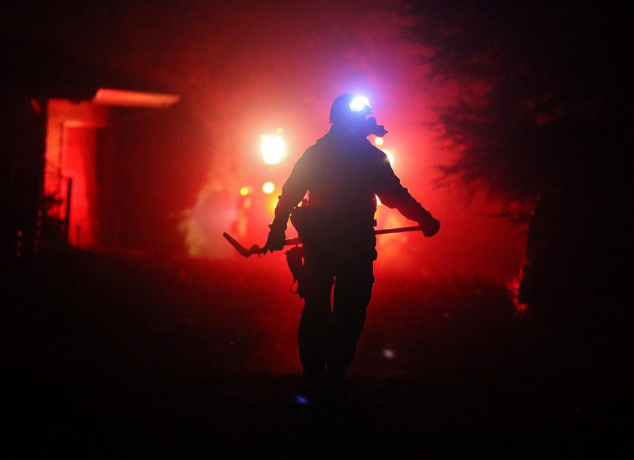
And again they called to heaven
When around them rose a hell;
Again the angels came from earth
In answer to the bell.
While flesh and blood fought smoke and flame
And kept the black line manned,
The thanks went to the god by whose
Own breath the fires were fanned.
**********
“And Again the Angels” ~ Quent Cordair, My Kingdom, 2019
“Firefighter Rick Blakemore protects a structure along Highway 128, south of Pine Flat Road, northeast of Healdsburg, on Sunday, October 27, 2019.” (Christopher Chung/ The Press Democrat)
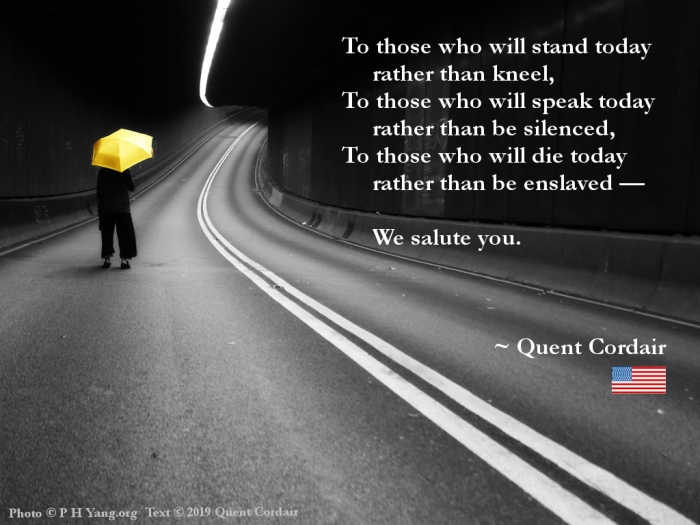
Friends, please feel free to share the above image widely, particularly with any and all who may have Hong Kong connections. May the photograph and the words help strengthen the resolve of those willing to stand for their freedom, for their lives, against the march of tyranny.
Award-winning photograph by P H Yang, used with permission.
#HongKong #Hongkonger #Freedom #Individualism #FreedomHK #rights #FreeHongKong
#NoChinaExtradition #hongkongprotests #StandWithHongKong
Castle Walls

Castle Walls
Peace, peace, but not a moment to be found,
No closet or armoire is free from the sound,
For now your enemies live here in your head—
Sitting at your table—
Waiting in your bed—
And who is to blame for their being inside?
What use, castle walls,
When the gate’s open wide?
~ Quent Cordair
***********
“Castle Walls” is from the My Kingdom collection of poems, short stories, & short plays for stage & screen, now available in paperback and Kindle editions.
No Sleep for the Angel
When the loss will ever be lost,
When the wrong will never be right,
When what’s due will be dealt,
But the wound ever felt,
No sleep for the angel tonight.
*****
* for Monteverde’s Angel
For more of my poetry, enjoy the My Kingdom collection of poems, short fiction, and short plays for stage and screen, now available in paperback and Kindle editions.
In good company ~
I’m honored to find myself in very good company indeed today, on the same page as Sophocles, under the heading, “Seven Great Poems on the Glory of Man.” With thanks to the editors at The Objective Standard. “A Call to Stand” is from the My Kingdom collection of poems, short fiction, and short plays for stage and screen, now available in paperback and Kindle editions.
My Kingdom ~ free Kindle copies for review
My Kingdom for a review — literally! Today I’m giving away three Kindle-edition copies of My Kingdom in exchange for short reviews. Even just a sentence or two will do. Average reading time: four hours. Your mileage may vary.
Sample snippets of reader-reviews of My Kingdom posted so far, to whet your appetite:
“…a highly recommended soul-quencher.”
“…an homage to the mind of man.”
“…a mind-engaging symphony of deliverance … Quent Cordair presents a benevolent universe and a gallery of heroic individuals fighting for an ideal life. Ultimately, it is a love story. It is real and, if you reach for it, it can be yours.”
“There is a refreshing benevolence in all of Cordair’s work, not sugar-coated, that is captivating, profound…”
Be one of the first three to volunteer in the comments, with the understood commitment that you’ll do your best to post a review on Amazon within the next 14 days, and a copy is yours!
Thank you!
Preview all the posted reviews of My Kingdom, now in paperback and Kindle editions, on Amazon.
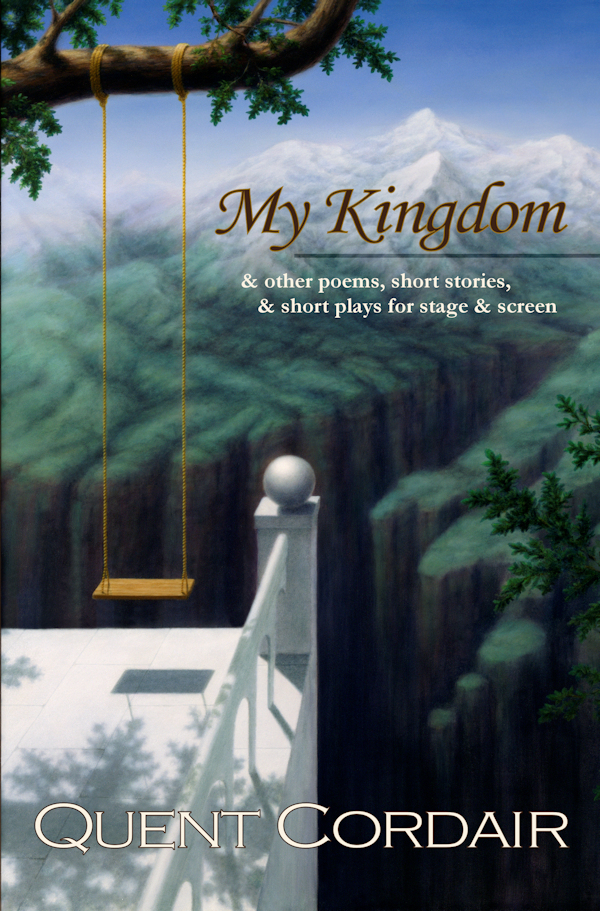 Quent Cordair’s My Kingdom is a select collection of poems, short stories, flash-fiction works, studies and musings from the author’s notebooks, short plays for stage and screen, special scenes from the Idolatry, and for the first time in print, the acclaimed short story “The Match,” together with the short screenplays “Mujahid” and “At Home with Heather James.”
Quent Cordair’s My Kingdom is a select collection of poems, short stories, flash-fiction works, studies and musings from the author’s notebooks, short plays for stage and screen, special scenes from the Idolatry, and for the first time in print, the acclaimed short story “The Match,” together with the short screenplays “Mujahid” and “At Home with Heather James.”
“For me, an artist’s studio can be as fascinating a place to visit as the gallery or museum in which his finished work is displayed. Practice sketches, studies, exercises, works in progress, casual pieces created solely for the artist’s own pleasure—while perhaps never intended for sale or public exposure—can be as wondrous and interesting as finished works that have earned the artist’s signature. Over the years, I’ve been encouraged by fans to publish the writer’s equivalent of such studio work—written sketches, descriptions, dialogues, style and period exercises, scene and character studies, musings, selections from works in progress. This collection includes, in addition to an assortment of such, a variety of shorter, finished works, from poems to plays, dating to before publication of the Lunch Break collection. To one and all, welcome again to my world, my way. Welcome to My Kingdom.” ~ Quent Cordair

“He completes me”
—said the Sea of the Moon.
The Moon, he did reply:
“As she flows to my push,
As she ebbs to my pull,
May we dance ever thus,
Till the dawn rises full.
While the day may me hide
While she sails her ships wide,
She’ll yet move to my shift,
I’ll yet draw to her drift,
Drawing closer and down,
Till Time forces relent—
And into her wet gown
I plunge shimmering,
spent.”
~ Quent Cordair
******************
 “He Completes Me” is from MY KINGDOM, Quent Cordair’s 5-STAR collection of poetry, short stories, and short plays for stage and screen. What readers are saying ~
“He Completes Me” is from MY KINGDOM, Quent Cordair’s 5-STAR collection of poetry, short stories, and short plays for stage and screen. What readers are saying ~
“…a highly recommended soul-quencher.”
“…an homage to the mind of man.”
“…a mind-engaging symphony of deliverance, composed by a brilliant mind who has most definitely lived and loved. Quent Cordair presents a benevolent universe and a gallery of heroic individuals fighting for an ideal life. Ultimately, it is a love story. It is real and, if you reach for it, it can be yours.”
“There is a refreshing benevolence in all of Cordair’s work, not sugar-coated, that is captivating, profound…”
MY KINGDOM is now available in paperback and Kindle ebook (only $2.99) from Amazon @ https://www.amazon.com/dp/B07SVGNQG6
Love Your Loves
Love your loves and love them well;
Claim your heaven, banish hell;
Live your life, hold treasures dear;
Laugh your laugh, cry your tear;
Stake your claim and work it deep
For goodness gain, goodness keep.
For this Father’s Day ~
For this Father’s Day, a favorite passage from Genesis, Part I of Idolatry, the meeting of the sculptor Apollonius and the boy Myron ~
***********
… It was just so, late one evening. He had worked through the night and day prior on another mausoleum frieze, trying to reach a state of exhaustion and numbness that would overwhelm him enough that he could sleep. In the scene, the mourners surrounding the dead body were distraught; all were focused on the deceased except one figure – a man who had turned to look out at the viewer, searching for an unfindable answer. His face was sorrow incarnate.
Apollonius sat on the floor, his head fallen, his body bowed over and so tired that he could no longer lift his arms, and still his soul hurt too much to rest. The tears began to fall, making silent splashes in the marble dust on the floor, as the night’s last candle burned low.
He sniffed – and heard an echoing sniff, disembodied, not his own. He sniffed again. Another small sniffle answered. He opened his eyes to find a toddler sitting on the floor next to him, gazing up at the funereal scene, tears rolling down the urchin’s dust-caked cheeks. He was begrimed but beautiful, with auburn-bronze curls and hazel eyes flecked with umber and gold. The bedraggled cloth draping his little body was a dirty rectangle of coarse, undyed wool, a hole cut out for the head. Of the pins meant to hold the sides of the cloth together, one had torn loose, the other had ripped nearly away and was hanging by only a few threads.
Seeing Apollonius’s distraught face, the boy began crying all the harder. The two looked at each other and cried on, emptying the depths of their grief until Apollonius could no longer bear the pathos, such a pitiable outpouring from such a flawless creature who surely could know so little yet of pain, a mere child with the prospect of a lifetime of joys before him. The scene had become an absurd injustice, and from somewhere in Apollonius’s soul, from a place he had thought had long died, something rose through the thick sadness, bubbling upwards to escape –
He laughed.
It was an agonized laugh, a pained laugh, but a laugh nonetheless, and the boy, in turn, laughed at the sound of it. Apollonius put his arm around the boy and pulled him close. The two cried and laughed together until the candle flickered its last, until the forlorn faces on the frieze had vanished into the blanketing darkness, until sleep overcame the night….
******
To enjoy more of the Idolatry story ~ https://www.amazon.com/Genesis-Idolatry-Book-Q…/…/B00MUWOWDW
For this “Earth Day”
For this “Earth Day,” a passage from A New Eden, Part II of Idolatry. The year, 1852:
***
…When the day ended and darkness fell, Thomas walked away from the wagon train and into the wilderness, headed south with a vague notion of going to Mexico, with nothing on his person but the clothes on his back, the knife on his belt and, in his satchel, a flint, a small package of hardtack and dried beef, and his father’s edition of Lyell’s Principles of Geology.
Through the night and the next day he walked, seeing not a trace of humanity and scant signs of wildlife. The next evening he found himself standing atop a high hill overlooking a desolate valley.
Close to the west, a range of snow-tipped mountains rose like the ramparts of a citadel. At the valley’s south end lay a shallow marsh fed by snowmelt, mostly dried up from the long summer’s heat, miles of alkali flats left in the ebb. The mountain shadows were growing long across the valley floor. The desert heat was cooling rapidly as the sky began to shift into the loveliest, most vivid palette he had ever seen—a parasol of pastels over hills turning tangerine and deep saffron, the mountains tinted cornflower-blue and violet. He gathered enough deadfall and brush for a small fire and, after a light supper, nestled down beside a low wall of stone he built to hold the fire’s heat. After reading a chapter of Lyell by firelight, he slept, with moonlight for his blanket and a stone for his pillow.
He spent three days alone on the summit—reading, thinking, remembering his father, considering his future, weighing his options, taking in the view. On the fourth morning, the fire had gone cold in the night. The scant supply of brush and wood on the summit was exhausted, as was his meager store of food. But looking out over the valley, he judged it to be the most beautiful place he had ever seen. The assessment was, he knew, due in no small part to the fact that he, Thomas Thornton Hale, was the only person in the valley. He had never enjoyed the luxury of having even the smallest corner of earth he could call his own. He and his father had shared the bedroom of their two-room cabin. On the wagon trail, a person had to venture over a hill or around a stand of trees for any privacy from fellow travelers. He looked around him that morning, from the rocks at his feet to the far horizons, and he said—“My hill.” He said it to himself and to the land and to the sky—“My hill. My valley. My world.”
There was no one there to dispute his claim. And so it was so.
He wanted to memorialize the moment and the place, but there was nothing resembling a flag or stake to plant in the ground. He had burned all of the loose wood. Other than rocks and scattered scrub, the only thing of substance left nearby was a barely living, severely torqued tree—an ancient bristlecone pine, wide at its base, with stunted arms and spindly fingers reaching for the sky, a few clusters of needles still surviving in the branches, roots clinging tenaciously to the back side of the summit. Other than a narrow strip of bark running up one side, the twisted torso and limbs were all but denuded, the exposed wood blanched white and polished smooth and hard as stone by the elements. Thomas carved his initials and the date into the trunk with his knife.
Having left his mark, he wanted something of the place to take with him. Over the past days, he had noticed a long thin vein of reddish quartz, not more than a few inches wide, cutting diagonally across the summit like a scar, exposed between the upended layers of porphyritic strata. Scattered pieces of the quartz had broken off at the surface. He chose one the size of a dove’s egg and put it in his pocket.
He was ready to rejoin civilization. There were things he needed to do before he could return to the valley….
*****

A Reaction to Beauty
The spirit of the angeli del fango ~
Confronted with something beautiful, an ache deep inside springs up and begs me to ask myself: “Have you done your part in making the world more beautiful? Have you repaid the universe for all the beauty and meaning it has offered you? Have you done enough? Can love alone settle your debts?”
The world has given me endless beautiful things. What have I done to deserve it? What can I do now to deserve it? I know logically that perhaps there’s nothing I should, or can, do. But when something causes such a wealth of emotions, it is hard to just sit there.
This can be seen in any emotion. Beg yourself not to cry when you’re truly sad, not to laugh when you’re truly joyous, not to yell when you’re truly angry. It is impossible. I feel the same when I experience true beauty. But there is no obvious…
View original post 429 more words
Should we pray?
Having chosen their course, they stood staring at the path ahead, the shadows lengthening. Only the near horizon was visible.
“Should we pray?” she offered.
“Prayer changes only the clock.”
“And the clock changes anyway.”
She reached for his hand.
“Let’s go then.”
“Let’s go.”
At Last
*****
It matters not which border crossed,
From desert dry or tempest tossed,
To waves of grain and freedom’s sigh,
From womb’s dark hold to first-light’s cry—
You’re here, you’re here, at last.
It matters not what age you came,
Eight months or eighty years the same,
What color skin your parents’ face,
What faith from which they fled to grace—
You’re here, you’re here, at last.
Now eye to eye, measuring minds,
The hopeful search for justice finds
No honest man can blindly curse
One more like he in chorus and verse
Than different—yes, in essence we
Are species same, from nose to knee—
As equals born with equal right
To live and work and dream the night
Where best we may, and here you are,
Your place of birth be near or far,
Your life and loves as dear to you
As mine to me—and this is true:
As innocent till guilty proved,
Against you none are justly moved.
So come, let’s toast to freedom’s song,
And may someday you pass along—
It matters not which border crossed,
To nurse’s hands or shoreline lost—
You’re here, you’re here, at last.
~ Quent Cordair
* * * * *
“At Last” is from the My Kingdom collection of poems, short fiction, and short plays for stage and screen, in paperback and Kindle edtions @ amazon.com/dp/B07SVGNQG6
I could not put the book down! I read the poems out loud to my kids as though I am Cyrano on stage! Inspires me to be the best I can be! Love it! ~ Heather Pendaris
If you enjoy life and a positive view of mankind, if you are a valuer and enjoy reading uplifting works, you’ll love this collection of short works by Quent Cordair. This is a great book when you just want a short read that will leave you feeling better than when you started, when you need a little emotional fuel. No need to read it as a whole, just enjoy a little morsel when you need it. You will find yourself going back for more, over and over. I have thoroughly enjoyed Quent’s longer works, but they are a deeper dive. This collection can be enjoyed even if you have only short spurts of time available for reading. I highly recommend it. ~ Steve M.
I can only say, if like me you admire human independence and have a belief that each of us are sovereign individuals and that the greatest joy can be found in seeing something admirable, reward yourself with a few hours of pleasure. Buy the real book .. read … enjoy. ~ Garrett Seinen
The My Kingdom collection is now available in paperback and Kindle editions. ~
*****
I write novels too. I recommend starting with Genesis, the first part of my five-part Idolatry saga. ~
Genesis
Part I of Idolatry
In the twilight of the Roman Empire, a sculptor struggles to keep an 800-year dream alive while honoring the love of his life and raising his adopted son. Part I of the epic five-part Idolatry saga, the story of a wealthy young heir and a devout Christian girl who find themselves at the heart of a 2400-year struggle for the soul of Western Civilization.
Beautifully written, on the order of Ken Follett’s Pillars of the Earth, with the historical insight of James Michener, it brings to life a time of great thought, great art, and its clash with religious fanaticism. Cordair writes with a poet’s sense of scene and nuance and gives us a great deal of insight into the mind of a sculptor; I found this an exciting and easy read. ~ Alan Nitikman
Enjoy Genesis in paperback, Kindle, or Audiobook today. ~
*****
Quent Cordair Fine Art, located in beautiful Napa, California, was established by artist Quent Cordair in 1996. As a premier provider of contemporary Romantic Realism in painting, sculpture, and drawing, QCFA has grown to serve an international clientele of private and corporate collectors. Explore our select offerings today at cordair.com. ~
For more of my published fiction ~ short stories, poetry, novels, stage and film scripts, available in ebook, paperback and audiobook ~ please visit my Amazon page. Thank you!
Check out my Q & A with The Fussy Librarian ~ ~ https://www.thefussylibrarian.com/newswire/for-readers/2018/06/22/author-qa-quent-cordair
Copyright 2018, Quent Cordair. All rights reserved.
My Kingdom
My kingdom has no subjects,
No serfs, their backs to bear
The weight of lives of others;
None here are forced to share.
A kingdom filled with kings and queens,
Their castles great and small,
With princes blue, princesses true,
Good dogs to guard them all.
A kingdom built with brains and brawn,
Each year less brawn than brains;
We sow and reap, invent machines
That till the fertile plains.
We sail and dream, we wing the skies,
Beguile with arts refined;
We trade for riches far and near,
Hold forth in courts of mind.
We mine and dine, automatize
The tasks that bore to tears;
Our engineers, second to none,
Lean back and toast to cheers.
Our six policemen quite suffice;
We’ve seven hard Marines
And thirteen jets with bombs so smart
That no one intervenes.
We welcome independent souls,
No honest man we shun—
Our markets thrive on goods well made,
On services well done.
Be immigrant or passing guest,
As equals all we greet;
New buyers all, new sellers some,
New friends and loves to meet.
My kingdom has no subjects,
No serfs, their backs to bear
The weight of lives of others—
Come join us if you dare.
~ Quent Cordair
* * * * *
For more of my published fiction ~ short stories, poetry, novels, stage and film scripts, available in ebook, paperback and audiobook ~ please visit my Amazon page. Thank you!
Check out The Fussy Librarian’s Q & A with me ~ https://www.thefussylibrarian.com/newswire/for-readers/2018/06/22/author-qa-quent-cordair
Copyright 2018, Quent Cordair. All rights reserved.
In which I’m interviewed by The Fussy Librarian …
“Author and artist Quent Cordair has come a long, long way from his upbringing….”
Check out The Fussy Librarian’s Q & A with me here ~ https://www.thefussylibrarian.com/newswire/for-readers/2018/06/22/author-qa-quent-cordair
A million steps
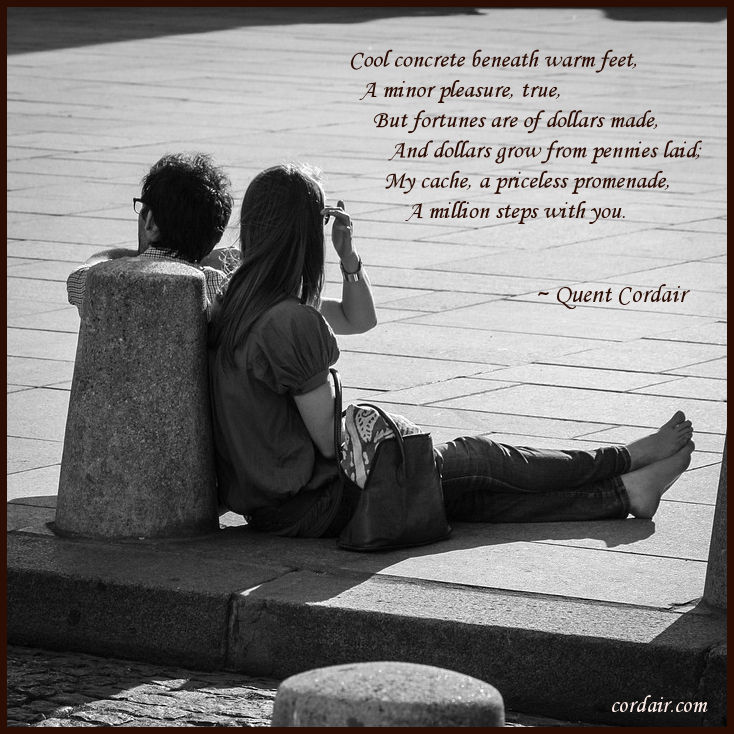
For this Mothers Day, an excerpt ~
For this Mothers Day, I offer an excerpt from the current draft for IDOLATRY, Part III, The Fruit of the Tree (working title):
The lines had shuffled forward. Paige found herself standing next to the mother. The baby, bundled in her arms, had settled and calmed. He was so beautiful, so right, his blue eyes as clear and complete as little planets, encircled with rays of long blond lashes. His lips were ripe petals, formed for ready suckling. His ivory skin was of the most translucent, softest white marble imaginable, a glowing blush in the cheeks only the most accomplished painter might capture. Every little hillock and vale of his little body’s topography, every rise and fall, every curve and round—it was all mere suggestion of the man to come, all mere promise, and yet, here he was, already present, already real. And flawless. To mothers everywhere, in all times, all but the most unfortunate babies are perfection, but Paige simply couldn’t imagine any woman wanting anything more or less than what this woman held in arms—a complete little world in himself, needing and wanting nothing more, lacking nothing, being everything. There was nothing to add, nothing to subtract, nothing to change. This—this perfect little thing should be untouchable, undefilable, always and forever. How could anything on earth or in heaven be more perfect and whole, in and unto itself? If only it could remain so, if only he might never come to know a moment of sorrow, of pain, of evil, of disappointment. Paige wanted to draw a circle of protection around him, an impenetrable halo of sacredness, to suspend time.
She was blinking away a welling wetness in her eyes. An ache had come to her heart, her stomach: she herself would never have that. She would never have what this woman had. She had never really even wanted it until now, never wanted a child, but at this moment, she found herself wanting it more than anything in the world. How could any woman not?
She looked up to find the mother watching her. Her eyes understood. Woman to woman, the one knew the other’s ache, recognizing the depth of the longing in a woman-child who had lost her own mother, a daughter who wanted nothing more, in that moment, than to be a mother herself.
The mother glanced down at her child, and back up to Paige. Wordlessly, she asked the question.
Paige could only nod, blinking back tears, stunned at the kindness of the offering, a place inside her heart breaking open.
As she accepted the baby, her arms naturally, gently formed around him. It felt so right. She felt her entire body warm with joy. He was so small, so light. She gazed into the blue orbs, perfect worlds of their own, as they gazed back into hers. She marveled the beauty of the little face in all its wondrous glory. He was staring back into a face that was new to him, too, seemingly as fascinated with her as she with him. Her rocking sway, the gentle bounce, had started without her realizing or intending it. She began humming a melody. Her lullaby. Skye’s lullaby….
*****
Parts I & II of Idolatry are available in ebook, paperback and audiobook on Amazon….
available in limited-edition through
Quent Cordair Fine Art in Napa, CA
(707) 255-2242
Spirited Gods
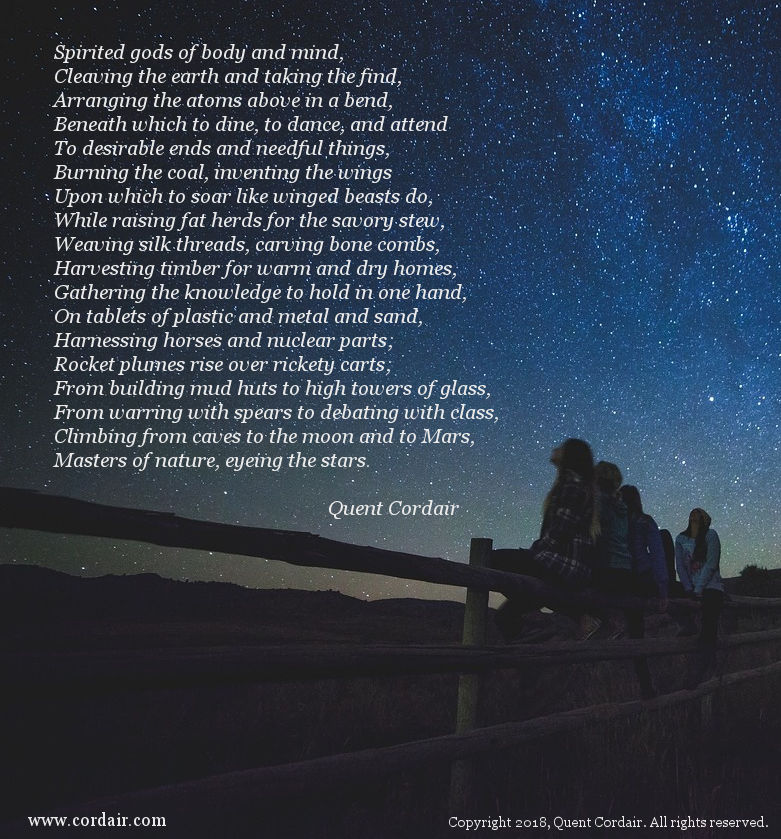
The real meaning of Earth Day
For this Earth Day, a brief passage from Chapter 3 of A New Eden, Part II of Idolatry:
*****
The sun had risen high. The breeze was warm on their faces. Ian produced a bottle of chilled white wine and two glasses, removed the cork, and poured. He raised a toast.
“To another day in paradise.”
She touched her glass to his. They drank, the sunbeams reflecting off the wine and the glasses, dancing across their faces, splashing in their eyes. The wine was crisp, light and good.
“Paradise . . .” she mused aloud.
He had used the word without a trace of sarcasm or irony. The dry ruins beneath their feet, the surrounding hills, and the alkali flats were predominantly in chalky browns, yellows and whites. The sparse native vegetation was all of the scrubby, hardier varieties, evolved over the eons to survive the long droughts, blazing summers and freezing winters of the high desert. From the reservoir, her eye followed the river, the presumable source of all things green in the valley proper. There were bends in the river’s line, but other segments were unwaveringly straight – it wasn’t a natural river at all, but a manmade canal.
“Paradise – ” She smiled at the epiphany – “just add water.”
Ian had laid out an offering of cheese, olives, fruit, and finger sandwiches. “When the first explorers came through this way,” he said, pausing to sample a strawberry, “the valley was a desolate wasteland. There was hardly a reason to even note it on the maps. Most of the early settlers passed north of here, following the Humboldt River west. The few who detoured this far south saw little if anything to recommend the valley – they barely paused on their way to California.”
Paige watched his eyes. They were shaded by the brim of his cowboy hat, following the lay of the land with an easy acceptance and steady intent. His body was relaxed, at one with the place, as if he too had sprouted from the earth here, watered and grown by the river that was a canal. She followed his gaze, trying to imagine the unwelcoming, harsh emptiness that the valley must have been.
“But one man came,” he said, “and that man stood alone on the top of this hill, above where we are now. He envisioned a paradise in this place – and proceeded to make it so.”
There was solemnity in his voice. Paige set her glass quietly on the stone. “Do tell. . . .” she urged.
He glanced at her, studying her in the same steady way he studied the land. Adjusting his hat, he took a bite of an olive, followed it with a sip of wine, and looked out to the horizon and beyond.
“At the time, that man wasn’t even a man yet – ” he said, letting the story begin – “but a boy.”
***
Enjoy the acclaimed IDOLATRY series in paperback, audiobook, and ebook ~ https://www.amazon.com/gp/product/B072HTC1FV
Plato’s children
ICE and the FDA are sister organizations, existing on the same plane, born of the same philosopher-king father and nanny-state mother. Both agencies were brought into existence on the same principle, to serve the same end: to stand between the individual and a class of things the individual might value, on grounds that only the government can properly judge whether the thing is good or harmful for the individual. Both agencies employ the same means. Through both organizations the government is to be the tester, the judge, the maker of standards, the sole decider as to the acceptability and appropriateness of the thing in question.
ICE stands between the individual and the immigrant, on behalf of the collective. The FDA stands between the individual and a drug or food, on behalf of the collective. The value to the individual of the thing in question can only be of secondary importance to the safety and welfare of the collective — and it is the collective that should decide what the individual may interact with and what he may not. The object in question is held as guilty until proven innocent, deemed unacceptable and illegal until tested, vetted, and shunted through the line of the government’s screens and the bureaucrats’ in-boxes, to be stamped as safe and acceptable, perhaps, but only as weighed against arbitrarily set governmental standards, and only after the arbitrarily established process has been exhausted. If individuals suffer or die in the meantime, this is of secondary concern to the safety and “good” of the collective.
This is preventative regulation, and it stands in stark contrast to rights-protective law. Preventative regulation violates the individual’s right to use his own mind as the sole judge of what is good for him and what is not. Proper rights-protective law goes after rights violators and rights violators only – and strictly contingent on objective evidence. Where there is objective evidence that a country, organization, or individual has violated the citizen’s individual rights or is threatening to violate the citizen’s rights, it is the proper role of government to act on the individual’s behalf against the threat.
Properly, government does not deem a medicine as dangerous until proven safe. It does not deem a surgeon born in India as dangerous until proven safe. It does not deem a field worker born in Mexico as dangerous until proven safe. It does not deem a friend, a lover, a fiancée, a spouse, an au pair, a student, an employee, or a potential business partner born elsewhere as dangerous until proven safe. It does not come between the individual and the product or person the individual has decided, by his own judgment, to value and to interact with. It does not use force to violate the individual’s own reason, his own judgment, his own choice as to what or who is good for him and what or who is not. It does not deem a potential cure for influenza or cancer or canker sores as dangerous until proven safe. It does not regulate opioids or ophthalmologists or Omanis.
“The only proper purpose of a government is to protect man’s rights, which means: to protect him from physical violence. A proper government is only a policeman, acting as an agent of man’s self-defense, and, as such, may resort to force only against those who start the use of force. The only proper functions of a government are: the police, to protect you from criminals; the army, to protect you from foreign invaders; and the courts, to protect your property and contracts from breach or fraud by others, to settle disputes by rational rules, according to objective law. But a government that initiates the employment of force against men who had forced no one, the employment of armed compulsion against disarmed victims, is a nightmare infernal machine designed to annihilate morality: such a government reverses its only moral purpose and switches from the role of protector to the role of man’s deadliest enemy, from the role of policeman to the role of a criminal vested with the right to the wielding of violence against victims deprived of the right of self-defense. Such a government substitutes for morality the following rule of social conduct: you may do whatever you please to your neighbor, provided your gang is bigger than his.” ~ Galt’s speech, Atlas Shrugged, Ayn Rand
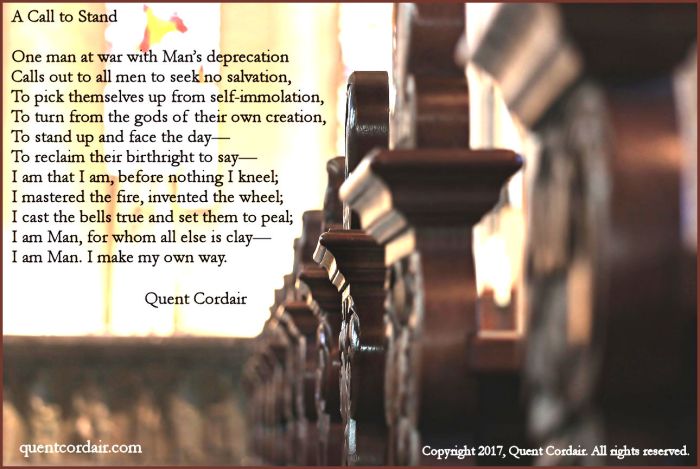
2018 Cordair Arts and Wine Weekend
July 6 & 7, 2018
Quent Cordair Fine Art
1301 First Street, Napa, California
Join us FRIDAY JULY 6th & SATURDAY JULY 7th for a weekend of art, wine, music, drama, art history, music theory and more!

Reserve your seat for only $25 total cost. Call the gallery today. 707-255-2242
~ PROGRAM SUBJECT TO CHANGE ~
FRIDAY EVENING, 6 p.m. to 9 p.m.
Art, Wine & Music Reception

A reception in the gallery, with excellent wine, splendid art, and live music on the grand piano by a platinum-award winning composer.
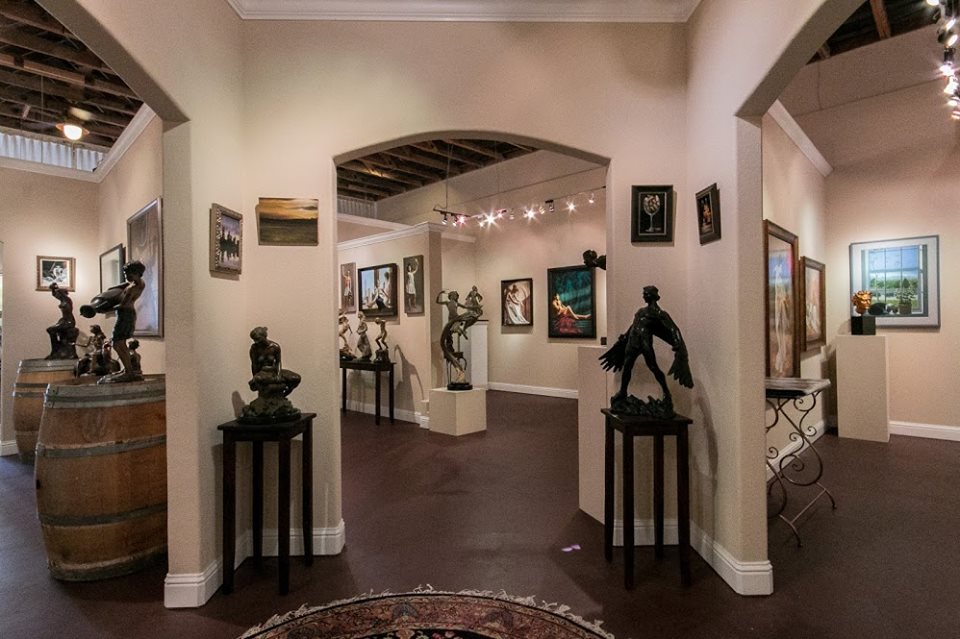
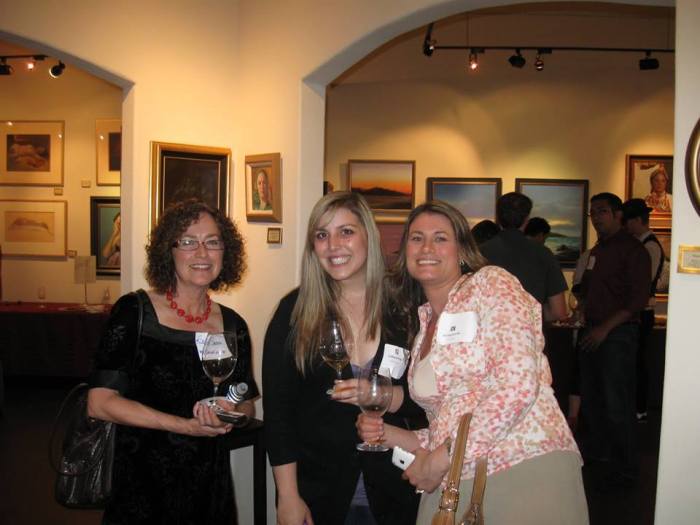
We are pleased and honored to announce that platinum-award winning composer/music producer Mars Lasar will be joining us at the grand piano Friday evening.
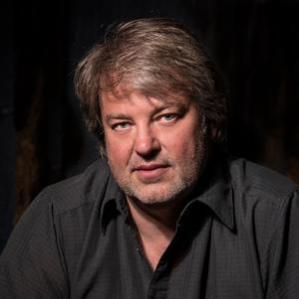
Born in Germany, raised in Australia, Mars Lasar is a prolific keyboardist and composer. Mars started playing piano at 11 years old, and over a few years of extensive classical and jazz training, he rapidly became drawn to all kinds of music. At 14, Mars began composing, recording and publishing his own music professionally.
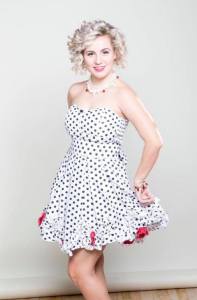 The lovely and talented Tori Anna Sophia, Napa Valley singer/songwriter, American Idol contestant, is scheduled to join us to share a sampling from her Doris Day repertoire. Tori Anna was the top female finisher in Michael Feinstein’s Great American Songbook Highschool Vocal competition in 2012.
The lovely and talented Tori Anna Sophia, Napa Valley singer/songwriter, American Idol contestant, is scheduled to join us to share a sampling from her Doris Day repertoire. Tori Anna was the top female finisher in Michael Feinstein’s Great American Songbook Highschool Vocal competition in 2012.
Our friends from Capp Heritage Vineyards will be offering complimentary tastings Friday evening for our guests. ~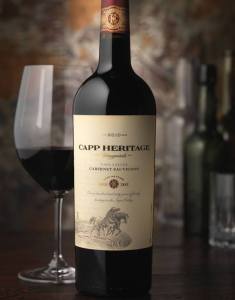
***
SATURDAY 10:00-11:30 a.m.
Turn-of-the-Century Artist-Entrepreneurs: Saint Gaudens, MacMonnies, Parrish
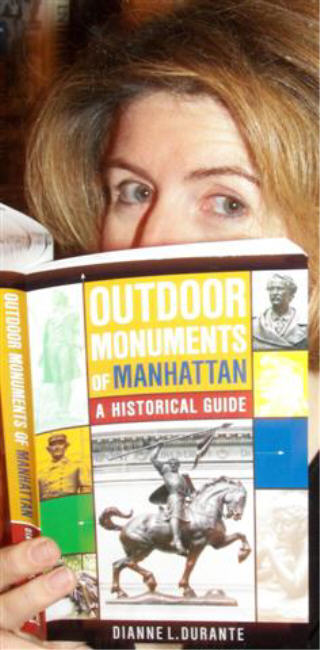
Dianne Durante, PhD
“In the late 19th and early 20th century, the most capitalistic era in American history, it was considered normal that the immense popularity of Augustus Saint Gaudens, Frederick MacMonnies and Maxfield Parrish should earn them substantial wealth. MacMonnies’ annual income in the mid-1890s reputedly reached $300,000 (about $7.5 million today). In 1925, one of every four American homes had a print of Maxfield Parrish’s Daybreak.
“This lecture gives a brief overview of the life and notable works of Saint Gaudens, MacMonnies and Parrish, within the historical, political, economic and philosophical framework of the period between the Civil War and World War I. If you enjoy hearing about intelligent, hard-working, innovative, highly skilled and profit-minded men making piles of money by creating beautiful works of art, then this lecture is for you.”
Dianne Durante, PhD in Classical Philology, is an art historian, independent researcher, freelance writer, lecturer, and tour guide.
***
SATURDAY 1:00-2:30 p.m.
Music and the American Left ~ A Study in Subterfuge

Stephen Siek
“In 1943, Ayn Rand exposed the intensity with which the American Left sought to inject socialist propaganda into literature and film by observing, ‘In the last ten years, the Reds have done a good job of building up literary celebrities for their own purposes. … These celebrities then appear on Red committees, endorse Red causes, build up other Red names, and the racket works as the radicals’ best propaganda method. … Look how savagely they have defended the art field from all intrusions of conservatives. They know its value.’ But literature was not the only fine art which American leftists (supported spiritually, and often financially, by the Soviet Union) conspired to dominate, and the full story of how socialists worked from behind the scenes throughout the twentieth century to transform American classical music into an instrument of communist propaganda has never been told. In this presentation, the covert methods employed by statists to control this country’s concert artists, symphonies, opera, and even ballet companies will be explored with reference to specific case studies. Images and recorded excerpts will also be used to help illustrate the power of the philosophic ideas that govern the marketing of art—and their inevitable political consequences.”
Stephen Siek is a pianist, musicologist, and piano historian; former professor of music at Wittenberg University; author of England’s Piano Sage: The Life and Teachings of Tobias Matthay and A Dictionary for the Modern Pianist.
***
SATURDAY 3:00-4:30 p.m.
An Introduction and Discussion: What Music Is and Does
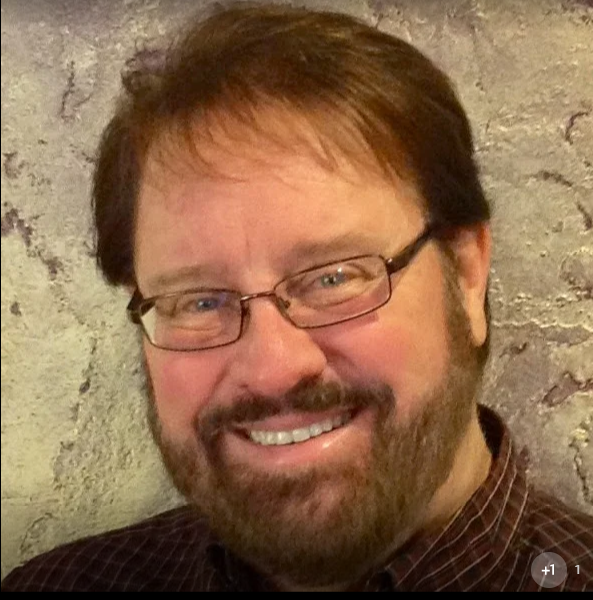
David Berry
Based on the speaker’s monograph, which includes essays inspired by Objectivism on music. A brief overview of a theory of music esthetics, with time for interaction with the audience on issues of interest.
David Berry is the Professor of Music History, Theory and Composition at the School of the Arts/Petrie School of Music, Converse College
***
 SATURDAY 7 p.m.
SATURDAY 7 p.m.
Wine Tasting & Education with winemaker Chris Daniel
Learn the nuances of wine tasting with a winemaker who makes Viognier, Rose of Cabernet Sauvignon, Syrah, Malbec, Cabernet Sauvignon, and Petit Syrah.
Smell, swirl, taste, and ask questions.
***
SATURDAY 7:45 p.m.
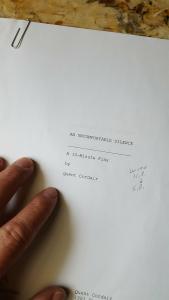 “An Uncomfortable Silence”
“An Uncomfortable Silence”
A short play written by Quent Cordair, performed by Hunter Schaufel & Elizabeth Brazil.

Elizabeth Brazil is an 18 year old singer, songwriter, and actress from Vacaville, California. She has been in over 15 productions at her Alma mater, Justin-Siena High school. Her favorite roll was Miss Adelaide in her senior year production of Guys and Dolls. She plans on pursuing her Broadway dreams in the fall and will be attending Marymount Manhattan College in the heart of New York City, New York.

Hunter Schaufel is a dedicated actor and recent graduate of Justin-Siena High School, where he studied and performed under the direction of James Thomas Bailey and vocal director Vivian McLaughlin. He has benefited, additionally, from five years of vocal instruction under Connie Lisec and foundational instruction in dance under choreographer and teacher Lisa Clark Schmeling. He recently received top marks in his acting exam administered by the London Academy of Music and Dramatic Art. Hunter looks forward to pursuing a career in product design and engineering, and is excited to begin classes as an undergraduate in the Georgia Institute of Technology’s mechanical engineering program in the fall.
SATURDAY 8:00 p.m.
A Program of Russian, German & American music
Stephen Siek, piano
Thomas Shoebotham, cello
David Berry, Composer & Commentator

American conductor and cellist Thomas Shoebotham performs the Bach Suite for Solo Cello #1. Equally at home on the concert stage and in the opera and ballet pit, Thomas Shoebotham conducts frequently with professional, community, and youth ensembles, collaborating with notable singers, dancers, and instrumentalists to bring “rousing, colorful” presentations to a variety of audiences.

Stephen Siek performs works for piano by Borodin, Scriabin, Reinagle, and a reprise of David Berry’s “Cordair Gallery” Suite, inspired by art in the gallery, first performed on the 2008 QCFA Arts Cruise.
Touching the Surface (Tom Seirak)
Henry’s Night Out (Quent Cordair)
Prometheus (Danielle Anjou)
Young Builder (Bryan Larsen)
Gaia’s Breath (Martin Eichinger)
The Anchorage (Bryan Larsen)
***
SUNDAY 10 a.m.
Mimosas, coffee, delectable treats, and of course art!
***
~ PROGRAM SUBJECT TO CHANGE ~
Napa Lodging: A special discount has been arranged at the beautiful new Archer Hotel located across the street from the gallery. Find availability and rates at https://archerhotel.com/napa/book/quent-cordair-fine-art
Additional lodging can be found that weekend starting at approximately $160 per night (at the time of this post) at other area hotels and bed and breakfasts. Groups of friends might consider an AirBnB home rental.
Attendees will receive goodie bags filled with local coupons, dining information, and sightseeing options.
Let us know if you would like to explore Napa while you are here and we can connect you with delicious wine-tasting opportunities at some of our favorite places.
Check back for additional program updates, lodging, dining and sightseeing suggestions.
For more information call Linda Cordair at 707-255-2242 or visit our event Facebook page at https://www.facebook.com/events/172009640082042/.
Visit www.cordair.com to explore our award-winning art gallery.
“Fake news”
About “fake” news: Never surrender the concepts of true and false. Words are important. How we use words is important. When someone mounts a campaign to conflate false with fake, his goal is to conflate true with real. When you surrender false for fake, you surrender true for real, and when you’ve surrendered true and false—when you’ve accepted real versus fake as the standard—he has you where he wants you, for then he needs only your acceptance of what he asserts as real, with asserted reality having become more important than truth, with accepted reality becoming what is asserted.
Never surrender true and false, if you value being able to identify what’s truly real, if you don’t want to fall for the false reality of a fake.
We allow conceptual lines to be blurred, to be erased, to be forgotten, at our peril. Beware the conceptual sleight of hand, the misdirection — the con artist’s tool. When someone assiduously avoids using the terms ‘true’ and ‘false’, and dislikes one of them so much that he works to replace it with a different term at every opportunity, ask yourself why that might be.
Also relevant: Identifying a second-hander ~ https://www.facebook.com/quent.cordair/posts/1409578702498677
***
My novels, short stories, poetry, and plays are available on Amazon…. Thanks so much for reading and for all your comments and reviews ~
Enabling
You probably know what an enabler is. The term is all too familiar to those who have been in therapy or counseling for their role in a co-dependent relationship, for their role in enabling the destructive behavior of an addictive and/or abusive loved one.
An enabler forgives, excuses, evades, rationalizes, being too fearful of what might be lost, too dependent on the relationship with the abuser to hold him fully and adequately accountable and responsible for his destructive actions. And so the enabler continues to support the abuser in a seemingly inescapable cycle, enabling the cycle of abuse, excuse, apology, the improved behavior until the worse behavior comes around again. The co-dependency and enabling is unfortunately common in relationships with abusive children, spouses, significant others, friends, parents.
Some exhibit a similar psychology in relation to what they believe to be their “heavenly father,” a parental figure praised and worshipped for whatever occasional joy, security, and affection he might provide – while whatever grief, loss, sickness and horror he causes or allows is suffered and endured. Any positive is praised and treasured, while all negatives are forgiven, overlooked, excused, rationalized away. Someone who is psychologically and emotionally dependent on such a parental figure believes he cannot afford to make the parent angry, cannot afford to reject the parent, must defend the parent, feeling utterly dependent on the parent for love and life, no matter how abusive or neglectful, no matter how deaf to the child’s cries the parent may be. In such a relationship, one endures all, justifies all, for the sake of the occasional demonstration of what is interpreted as love and affection, for the occasional “good day” between all the bad, for the parent’s protection, for the parental security. But it is a relationship of utter dependency.
The same psychology and behavior is exhibited by many towards a religious leader, an employer, a führer, a king – a president. The only full and lasting cure is independence: intellectual independence, physical independence, psychological independence, emotional independence. Until independence is fully achieved, the bruising will continue, the enabler finding it necessary to keep the makeup and excuses handy while hoping to keep the abuser sufficiently mollified and distracted, hoping that the bad never becomes worse, while the abuser never lets the enabler quite forget, by how he treats or threatens to treat others, how much worse it could be.
***
My novels, short stories, poetry, and plays are available on Amazon…. Thanks for reading, and for your comments and reviews ~
New year, same resolve, same banner

And Again the Angels
Again they called to heaven
When around them rose a hell;
Again the angels came from earth
In answer to the bell.
While flesh and blood fought smoke and flame
And kept the black line manned,
Their thanks went to the god by whose
Own breath the fires were fanned.
***
The original “Again the Angels” is here …
For more of my published fiction — shorts, poetry, novels & scripts, available in ebook, paperback and audiobook — please visit my Amazon page.
Silenced
From the river to the sea, they cried,
This land it must be free.
From the river to the sea, they screamed,
What we demand must be.
The Jordan’s banks will overflow
With crimson current high,
Awash with dead unto the Dead,
Till Galilee runs dry.
From the river to the sea, they cried,
We righteously require
That those within who dare to stand
Against us must expire.
For others bound to other books
Can tolerate no choice;
They must be free to kick and kill,
To throttle every voice.
And so it was, it came to pass,
From the river to the sea,
Once champions of the gunning thugs
Were marched and put to knee—
Lined on the shore, the silenced cried,
Bowed down, awaiting shot—
The river fed, the sea turned red,
The floating left to rot.
~ Quent Cordair
“Silenced,” Copyright 2024, Quent Cordair. All rights reserved.
The Federal Death Agency
This one is for Andrew and Olivia. Having lost two dear ones to cancer over the past two days—a good friend on Sunday, a treasured performing artist yesterday—I promised that today, in their honor, I would “rail against the ideas and premises that have kept cancer alive, and against those who support, defend, and further such ideas.” Here comes the railing:


The FDA is truly and accurately, without exaggeration, the “Federal Death Agency.”* It’s the Federal Death Agency, the Federal Suffering Agency, the Federal Life-Shortening Agency, the Federal Disease & Sickness Prolonging Agency, the Federal Shackling & Prohibition of Desperately Needed Medicines & Procedures Agency. The FDA, if there were full truth in advertising, would be flying the Skull & Crossbones over their headquarters daily. The incalculable measure of death, suffering, pain, illness, and misery inflicted by this one agency alone is staggering.
And yet the agency itself is not the real problem. The agency is but a predictable, inevitable, logical symptom of the underlying disease, and the cause of that disease is both wholly self-inflicted and wholly curable. The cause of the disease, of which the FDA is a symptom, is 100% man-made. That man-made cause could be cured and eradicated immediately, could be destroyed forever, today—but it won’t be, not today, not tomorrow, not for many years to come, because the majority of men and women are so addicted to the cause, so vested in the cause and dependent on it, they would rather suffer and die themselves than face the responsibility for supporting and defending it. They would watch their own loved ones suffer and die before they would question, examine, reject, and replace the cause of that suffering and death with the only viable alternative—an alternative which already exists. Yes, the cure for the disease, of which the FDA and its horrific effects are but a symptom, already exists.
No one and no agency has the moral right to stand between an individual and his choice of any and every medical option available to him, especially when his life and health are at stake. No one and no agency has the moral right to stand between the inventors, producers, and providers of medicines, medical equipment, and medical procedures, and the patients who desperately want and need those products, procedures, and services, those who are willing, by their own judgment and moral right, to risk trying whatever available option in the face of the alternatives.
Those who believe and hold otherwise, that humans are by nature incapable of making their own healthcare choices, or shouldn’t be allowed to, for altruistic reasons, are operating on the very premises that caused the creation of that murderous entity which is the FDA. Those who hold that the individual’s own healthcare choices should and must be subordinated to the “greater good,” that the good of the individual should be sacrificed to the good of the less intelligent, the less educated, the “less fortunate,” are operating on the very premise that results in the unnecessary suffering and premature death of thousands, indeed millions, including the unnecessary suffering and death of those nearest and dearest to them.
Yes, if not for the philosophical premises of altruism that support the FDA, premises held by most Americans left and right, cancer, along with so many other diseases, would already be well behind us. Andrew Bergman, Olivia Newton-John, and countless others would still be with us today, happily living their lives. For those fortunate enough not yet to have succumbed to Andrew and Olivia’s fate, those who might still believe that the existence of the FDA is in your best interest—please do yourself a favor: think again. Or as Ayn Rand would say, check your premises. Discover the rational, life-saving alternative.
FDA delenda est.
***
*Credit to Harry Binswanger for the accurate epithet. See the article “The FDA is the Federal Death Agency” for further consideration. For the proper, principled approach to defending private medicine, see https://ari.aynrand.org/issues/government-and-business/health-care/ .
Out of the Old
This poem was penned seven years ago, with someone wheelchair-bound in mind, as she faces the approach of another year, a new year. With so many having been housebound and restricted this past year, with so many still being so, may “Out of the Old” lift and inspire. From the My Kingdom collection, 2019. ~
Out of the Old
Yet another year, she thought,
Sitting in her chair, she thought.
Still she might, she thought,
Still she would, she thought,
Till she did, she thought —
Her soul, willed and willing,
Rose and waltzed more lightly even
Than her body ever had,
Out of the old, into the new.
~ Quent Cordair
My Kingdom, my latest collection of poetry, short fiction, and short plays for stage and screen, is now available in paperback and Kindle editions. ~
I could not put the book down! I read the poems out loud to my kids as though I am Cyrano on stage! Inspires me to be the best I can be! Love it! ~ Heather Pendaris
If you enjoy life and a positive view of mankind, if you are a valuer and enjoy reading uplifting works, you’ll love this collection of short works by Quent Cordair. This is a great book when you just want a short read that will leave you feeling better than when you started, when you need a little emotional fuel. No need to read it as a whole, just enjoy a little morsel when you need it. You will find yourself going back for more, over and over. I have thoroughly enjoyed Quent’s longer works, but they are a deeper dive. This collection can be enjoyed even if you have only short spurts of time available for reading. I highly recommend it. ~ Steve M.
I can only say, if like me you admire human independence and have a belief that each of us are sovereign individuals and that the greatest joy can be found in seeing something admirable, reward yourself with a few hours of pleasure. Buy the real book .. read … enjoy. ~ Garrett Seinen

If you prefer novels, I write those too. I recommend starting with Genesis, the first part of my five-part Idolatry saga. ~
Genesis
Part I of Idolatry
In the twilight of the Roman Empire, a sculptor struggles to keep an 800-year dream alive while honoring the love of his life and raising his adopted son. Part I of the epic five-part Idolatry saga, the story of a wealthy young heir and a devout Christian girl who find themselves at the heart of a 2400-year struggle for the soul of Western Civilization.

“Beautifully written, on the order of Ken Follett’s Pillars of the Earth, with the historical insight of James Michener, it brings to life a time of great thought, great art, and its clash with religious fanaticism. Cordair writes with a poet’s sense of scene and nuance and gives us a great deal of insight into the mind of a sculptor; I found this an exciting and easy read.” ~ Alan Nitikman
Enjoy Genesis in paperback, Kindle, or Audiobook today. ~
*****
Quent Cordair Fine Art, with galleries in Napa, California, and Jackson, Wyoming, was established by artist Quent Cordair in 1996. As a premier provider of contemporary Romantic Realism in painting, sculpture, and drawing, QCFA has grown to serve an international clientele of private and corporate collectors. Explore our select offerings today at cordair.com. ~


Nice
Nice
#Nice #nicefrance
Again comes the cry, again comes the mourn,
Clutched fingers in hair over flowers forlorn;
Candles all lit till the night wetly glows,
Coffins wrapped neatly in black satin bows.
Shadows beg mercy where mercy’s unknown,
Prayers and peace offerings, fruitlessly sown,
The desperately hoping more love will suffice
For those taking no less than blood sacrifice.
There’s left but one answer to those who love death,
Whose sword demands kneeling until the last breath,
Those blinded to reason, faith shrouding their eyes
Till blackened beaks probe, their creed’s final prize.
There’s left but one choice, for those who love life,
In answer to those sworn to murder and strife:
When faith-deafened minds every argument shun,
When no word can turn what no logic has won,
When pleas cannot stay the raised knife or drawn gun,
Swift granting of death is the deed sooner done.
~ Quent Cordair
